Spinoza's portal: Nature as a temple
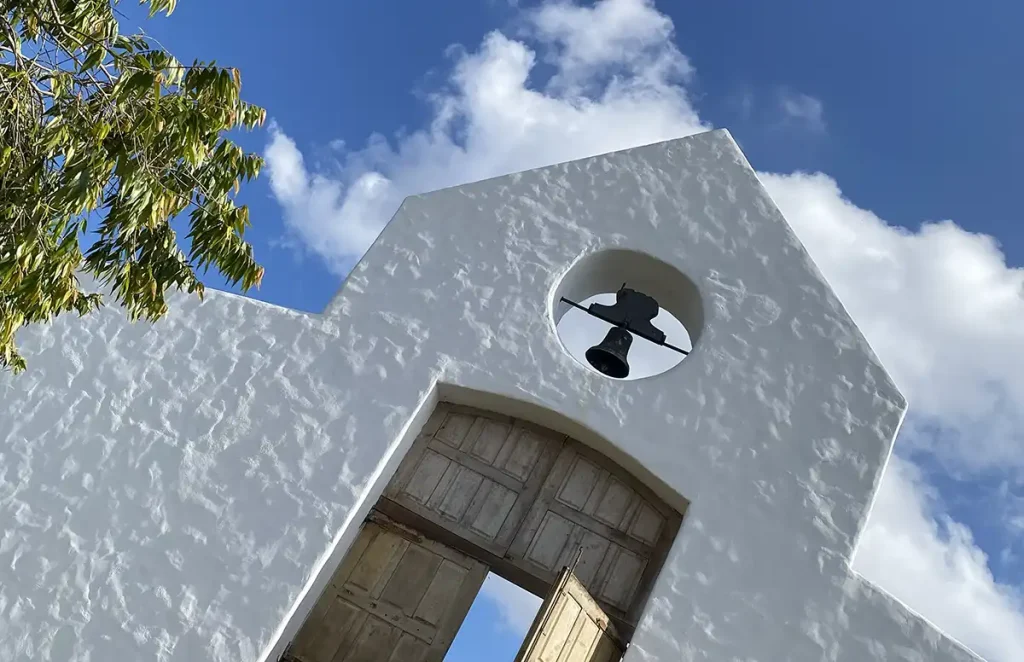
Between philosophy and infinity, a symbol stands out at the top of Ibiti. At the top of Chapadinho at an altitude of 1,200 meters, a white and silent structure invites contemplation. It is the Portal of Spinoza, which combines architecture, philosophy and spirituality in perfect harmony with the landscape. From afar, the façade resembles that of a church. Up close, it reveals a monumental six-meter-high door, acquired more than 20 years ago. The bell rests at the top, completing the scene that unites the sacred and the earthly. The vision behind the Portal The inspiration came from a simple image. Renato Machado, creator of Ibiti Projeto, saw a church façade in the Northeast, remembered the old doors and, as he was reading "Spinoza's Secret", came up with the idea for the building. "You open the portal and see God, because if you can't see God in that wonderful view, you won't find God anywhere," he said, agreeing with the philosopher. Here, the beauty of nature is the very experience of the divine. Harmony and contemplation According to engineer Hugo Cambraia, the portal follows the proportions of the golden ratio, a principle that governs the most harmonious forms found in nature and the arts. It is 16 meters long, 11 meters high and just 1 meter wide, measures that reflect perfect balance and proportion. Made of masonry, the monument fits into the terrain, from where you can see a 360-degree panorama. From there you can see the eastern slope of the Ibitipoca State Park, Areião, Pico do Peão, the Pão de Angu and Cabeça de Formiga hills, the town of Pedro Teixeira and, in the distance, the lights of Juiz de Fora. On clear days, the view reaches as far as Pico da Bandeira, in the Serra do Caparaó. Deus sive Natura The name of the Portal pays homage to Baruch Spinoza (1632-1677), the Dutch philosopher who redefined the notion of God and inaugurated a new form of spirituality. For Spinoza, God and Nature are one and the same reality, an infinite substance that manifests itself in everything that exists. "Everything that exists exists in God, and without God nothing can exist or be conceived," he wrote in his masterpiece, Ethics. Unlike the traditions that place the divine outside the world, Spinoza saw it in every mountain, in every stone, in every thought. Human freedom, he said, lies in understanding the laws of nature and living in harmony with them. For this reason, Spinoza's Portal is more than a viewpoint: it is a symbolic crossing between the rational and the contemplative, between thought and the direct experience of the sacred. A living space The space can host meditations, yoga practices, soundhealing, contemplative breakfasts, meetings and sunrise ceremonies. The place also serves as a backdrop for personalized events, such as celebrations and weddings, where the decoration is nature itself. Find out more ibiti.com @ibitiprojeto @ibiti.village @ibitiengenho
Ibiti: A global example of regenerative hospitality
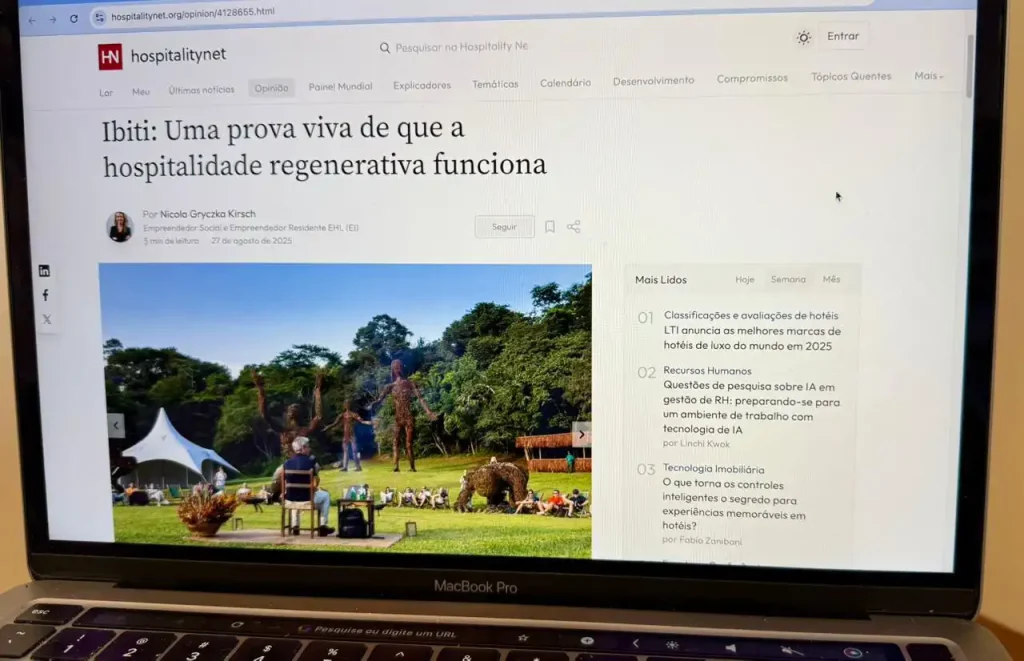
Ibiti Projeto is featured on Hospitality Net as a global reference in regenerative hospitality, uniting rewilding, community and innovation.
SP-Ibiti air bridge: Nature closer to you!

Getting to Ibiti has never been so easy - and so enchanting. Now, a regular SP-Ibiti flight connects São Paulo to Ibiti Projeto in just 1h20, shortening distances and bringing guests closer to one of Brazil's most unique experiences. Thanks to an unprecedented partnership with Flapper, a benchmark in executive aviation, weekends have a new possibility: take off from Campo de Marte on Friday afternoon and, a few hours later, be immersed in the trails, waterfalls and flavors that make Ibiti Projeto a unique destination in the world. "More than just shortening distances, this project represents a milestone in the consolidation of Ibiti as a benchmark destination for sustainable hospitality, regeneration and culture. We want access to be as special as the experience that awaits each guest here," says Hugo Cambraia, Ibiti's CEO. Comfort in the air, freedom on the ground The route is operated in a Caravan Grand, a safe and comfortable aircraft for up to nine passengers, with ample luggage for bicycles, musical instruments or suitcases for those who come to experience intense days of nature and well-being. "The Ibit Project is ready to position itself as one of the favorite destinations for weekend getaways for the public in São Paulo, Rio de Janeiro and Belo Horizonte," says Paul Malicki, CEO of Flapper. "We chose the Caravan Grand because of its safety and luggage capacity, replicating our model of shared flights already consolidated on other routes." In addition, Ibiti Projeto guests who choose to stay from Sunday to Thursday can enjoy special rates on repositioning routes, starting at R$ 750 per leg. Exclusive experiences With the air bridge on the same weekend, it is possible to: - Enjoy a candlelit dinner- Attend piano concerts- Cycle along the more than 300 km of trails- Enjoy therapies and spas- Watch the sky, the sun, the moon and the stars- Dive into crystal-clear waterfalls All this in a conservation and regeneration territory of around six thousand hectares, which unites nature, art, philosophy and Minas Gerais hospitality. The runway that was born of a dream Recently renovated, the Carolina de Assis Aerodrome (SJXM) now has an asphalt sidewalk, an expanded patio and operations compatible with executive aircraft such as the Caravan, King Air and Pilatus. Located at an altitude of 1,100 meters, the runway is 860 meters long and 15 meters wide, with an 8º incline and a patio with capacity for up to 4 aircraft. The dream of the runway was born with Carlinhos Repetto, founder of Ibiti Projeto, inspired by mountain airports such as Courchevel. In challenging terrain, in the first decade of the 2000s he made it possible to build it in a clearing in the middle of the forest, without having to cut down a single tree. The airfield was named after his mother, Carolina de Assis Repetto (1920-2025). The first woman to earn her aviator's license in Minas Gerais in 1939, Dona Lilina, as she was known, defied the standards of the time with boldness and courage. She flew aerobatics in her PP-GAN airplane, represented Minas Gerais in competitions and also stood out as a self-taught architect and the matriarch of a large family. Carolina passed away in February 2025, at the age of 104. Celebration The official inauguration, on September 18, brought together authorities, partners and friends of Ibiti Projeto, marking the beginning of a new stage for sustainable tourism in Ibiti Projeto. Fighting fires The airstrip not only shortens the distance between São Paulo and Ibiti Projeto, but is also a strategic support point for fighting fires in the region. In 2021, during a fire in the park, the operation was only contained with the help of aircraft hired by Ibiti Projeto, which used the then grass airfield as a base. With the renovation and asphalting, the runway now offers an even safer and more efficient infrastructure to support emergency actions, as well as allowing guests to fly exclusively. Book your seat flyflapper.com Information and accommodation (32) 98449-2200 (32) 99984-7626 Find out more ibiti.com @ibitiprojeto @ibiti.village @ibitiengenho
Ibiti Vegan Summit 2025: activism, taste and purpose
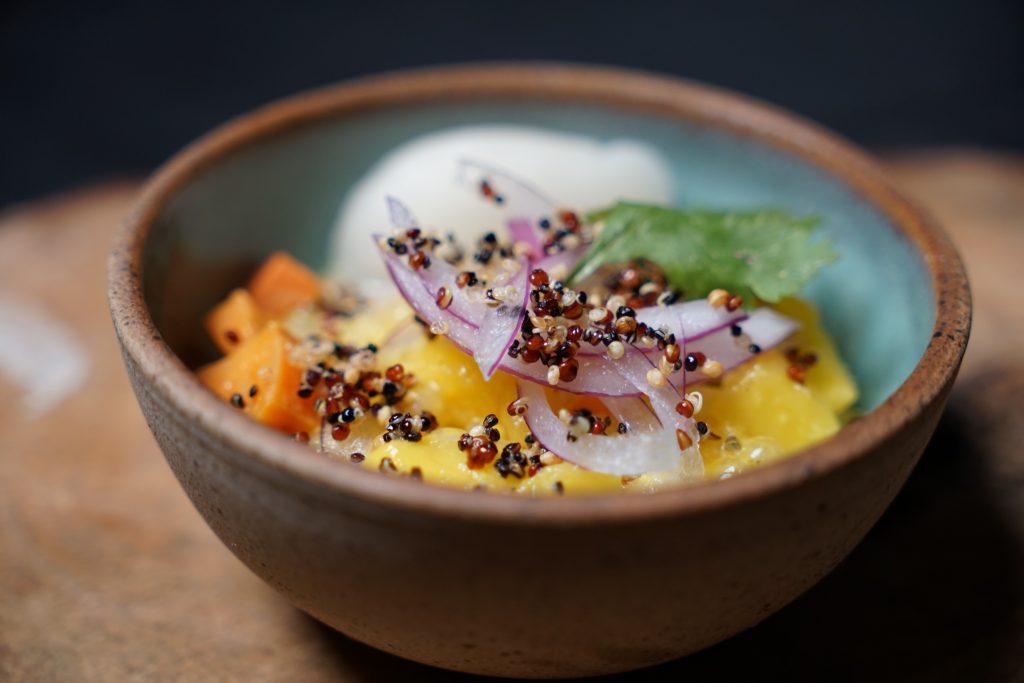
From September 22 to 26, 2025, Ibiti Projeto will host the second edition of the Ibiti Vegan Summit, a meeting that brings together plant-based gastronomy, activism and experiences of connecting with nature. The program brings together renowned chefs, international thinkers and creatives who have been showing the world that veganism is not only an ethical choice, but also a lighter, more beautiful and transformative way of living. For five days, participants will immerse themselves in experiences that go far beyond the plate: workshops with world-renowned psychologist Dr. Melanie Joy, themed dinners by chefs such as Dani Rosa, Tiago Feitosa, Luiza Maffort, Pri Herrera, Tati Lund and Thiago Medeiros, as well as panels on branding, sustainable fashion, lifestyle and the new paths of activism. Hiking trails, waterfall dives, stargazing and wellness practices complete the experience. "The idea is to show that activism can be light, beautiful and collective. Veganism doesn't have to be seen only as renunciation or sacrifice, but as celebration, exchange and inspiration. Ibiti, with its regenerative energy, is the perfect setting for this experience." Alex Soderberg, co-founder of Naveia and organizer of the event In the vegan calendar Ibiti Vegan reinforces Ibiti's mission to connect people, ideas and sustainable practices in a territory that combines environmental regeneration, art, gastronomy and spirituality. Co-produced by Naveia and Comuniversidade, the 2025 Summit promises to become one of the most important meetings on the Brazilian vegan calendar, bringing together activists, creators and those passionate about a more conscious life. See the full program Ibiti Village - Lima Duarte, MG22 to 26 September 2025 Information and reservations: (32) 98449-2200 Find out more: @ibiti.village
Ibiti: an "Incredible Place to Work"
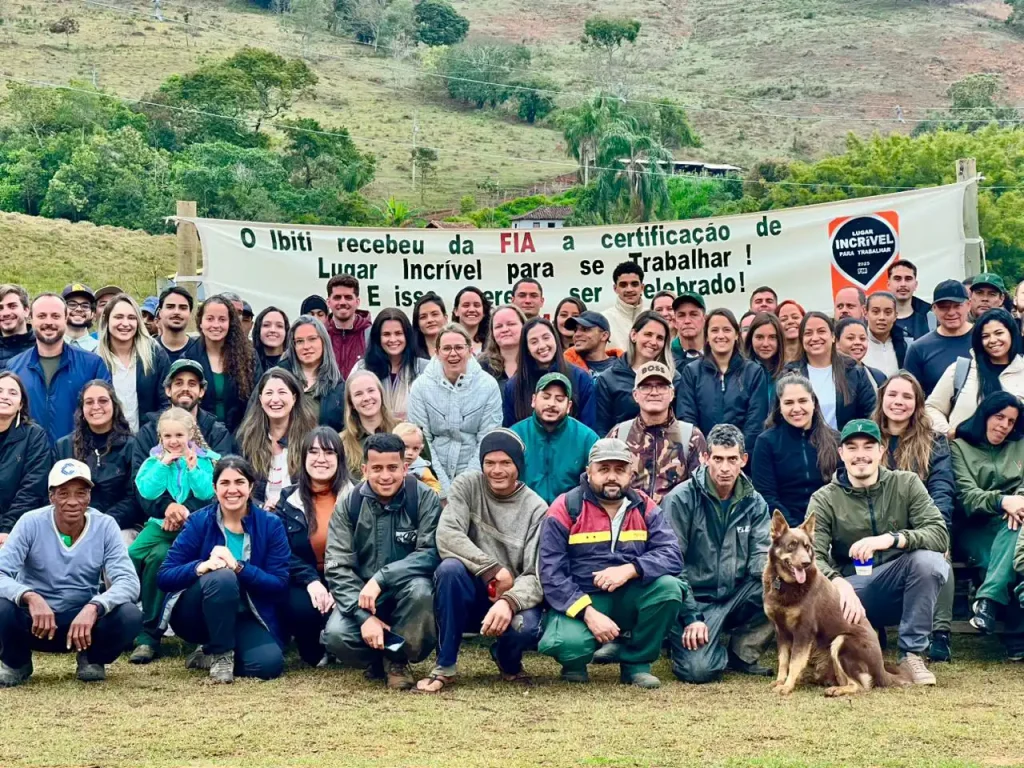
The Ibiti team started the day today in a very special way. Before starting their activities, they were surprised with a hearty breakfast to receive some news that deserves to be celebrated: certification by the FIA Business School as an "Incredible Place to Work". The recognition comes after an internal organizational climate survey conducted by FIA, one of Brazil's leading business schools, which assesses the level of employee satisfaction. To achieve the certification, the organization needs to achieve a minimum score in the Organizational Climate Index (i-Co) and have significant participation from its team. Ibiti met these criteria, proving that it builds a collaborative and inspiring work environment every day. More than just a seal, this achievement reflects Ibiti's community spirit, where every employee has a voice, room to grow and the opportunity to live out purpose in their daily lives. "This seal shows that Ibiti is a place that allows you to create and transform. And none of this would be possible without every smile, every idea and every effort from our team. This certificate belongs to all of us," says Rubiana Cruz, Ibiti's Human Development manager. Join us!
Bike track in Ibiti warms up the mood for Sertões MTB
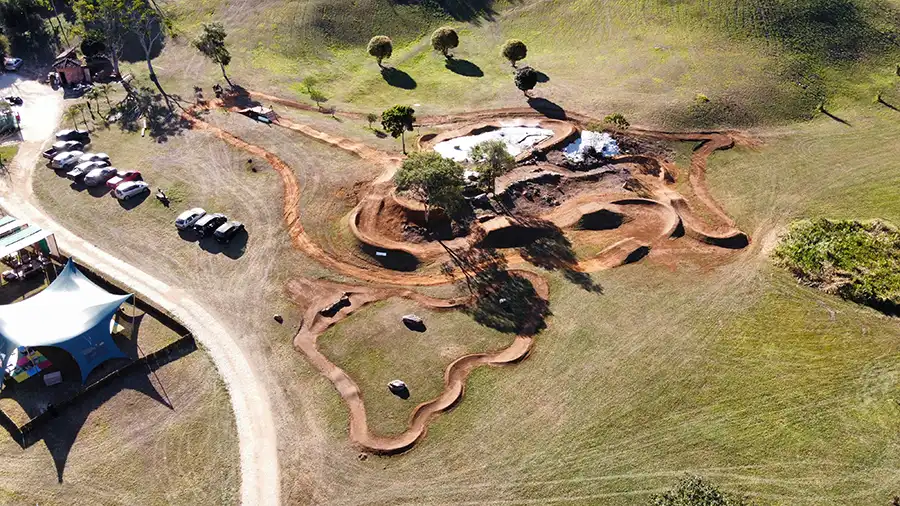
Ibiti has gained another space for those who love cycling: the new bike track, built at Engenho Lodge in partnership with Sense, promises to be a meeting point for cyclists of all ages. As well as promoting health and fun, the new circuit reinforces Ibiti's connection with sport and with reducing the carbon footprint, since the bicycle is one of the most sustainable means of transportation. "The track looks great and will really encourage sport, especially among children. Cycling is on the rise today, and initiatives like this encourage the community. This track can be used by anyone, on any type of bike, even electric bikes. It can be used for training, evolving movements, having fun and overcoming challenges. The most important thing is that it becomes an incentive for sport and fun, bringing more and more people to cycling," says Miguel Giovannini, mountain bike champion, entrepreneur of the Bike House in Ibiti Village and Ibiti Projeto bike guide. Named the Sense Bike Zone, the track brings together curves, ramps, descents, jumps and even a bridge, as well as making intelligent use of the natural elements of the terrain, such as rocks and trees. Nothing has been wasted: everything has been integrated into the course, reinforcing the connection between sport and nature. "The main aim is to enable children to overcome challenges and feel this connection with nature. In an increasingly technological world, structures like this offer unique experiences, capable of inspiring future athletes and sports enthusiasts," explains Daniel Teixeira Sales, Niel, a specialist in multi-sports tracks and responsible for the work. Sertoes MTB: from September 4 to 6 The novelty arrives in tune with Sertões MTB 2025, which will have Ibiti Projeto as its stage for the fourth consecutive year. After passing through Campos do Jordão (SP) and Nova Lima (MG), the third stage will define the season's champions in three days of challenging races, between September 4 and 6. In addition to the competition categories, the event will debut the Turismo Category, aimed at those who want to ride at a lighter pace, with E-Bikes, enjoying the trails and landscapes of Ibiti without the pressure of competition. It will take place on Saturday (6), with an estimated 30 km route, accompanied by guides and monitors. Limited places (registration here). "We're making cycling a national passion, and it's wonderful to have partners like Ibiti who believe in this purpose with us," celebrates Leonora Guedes, CEO of Sertões. Closing party with Wilson Sideral Another attraction will be the unprecedented awards party that closes the Sertões MTB Ibitipoca and the Sertões MTB Cup on Saturday night, after the winners of the stage and the champions of the season have been consecrated, with a concert by Wilson Sideral and his band. The general public will also be able to attend - tickets are now available via the link. As in the first two stages of the championship (Sertões MTB Mantiqueira and Sertões MTB Nova Lima), big names in mountain biking will also be in Ibitipoca. Among them, Albert Morgen, Sherman Trezza de Paiva, Hugo Prado Neto, João Paulo Firmino, Lukas Kaufmann, Márcio Ravelli, Miguel Giovannini and Luciano "Kdra" Lancellotti. In the women's race, Isabella Ribeiro and Roberta Kelly Stopa stood out. Find out more about Sertões MTB 2025
Muriqui Day: how preservation began in Ibiti

On August 27, we celebrate Ibiti Day and Muriqui Day, the largest primate in the Americas and a critically endangered species. For Ibiti, the date has a special meaning: it was here that Muriqui House was born, an unprecedented project to preserve the northern muriqui (Brachyteles hypoxanthus). It all started with the determination of Carlinhos Repetto, founder of Ibiti Projeto. Through reports from local residents, he knew that there were still muriquis living in Mata do Luna, an area threatened by deforestation. After a tireless search, Carlinhos managed to make the first photographic record of a northern muriqui in the region in 2002, confirming its occurrence. Listen to the audio Destiny transformed "I had been looking for this monkey for years," recalls Carlinhos. "This record was very important. It's on the back cover of the first book 'Reserva do Ibitipoca'. The photo of the monkey on the cover is by Araquém (Alcântara). When you open the book, there's a large black and white photo of the monkey, which was the first photographic record." At the time, Carlinhos found trees in full bloom with muricis, the monkeys' food, marked for felling. He went to the owner of the area and, with the support of his cousin Renato Machado, one of the creators of Ibiti, managed to buy Mata do Luna. This gesture was decisive: it guaranteed the preservation of the forest and started a conservation project that still resonates today. "It all started there," says Carlinhos. "I shouted to the world that it had to be preserved." And so the story of protecting the muriquis in Ibiti was born. Today, four decades on, the fight for the muriqui's survival continues. The Ibiti Project continues with regeneration and conservation actions, with unprecedented initiatives such as the Muriqui House project, developed in partnership with the Muriqui Biodiversity Institute - MIB. A historic step towards guaranteeing the future of the species. Celebrating Muriqui Day is above all celebrating the courage and vision of those who believed that preserving nature can transform destinies.
Ibiti: 43 years of inspiring dreams and possibilities
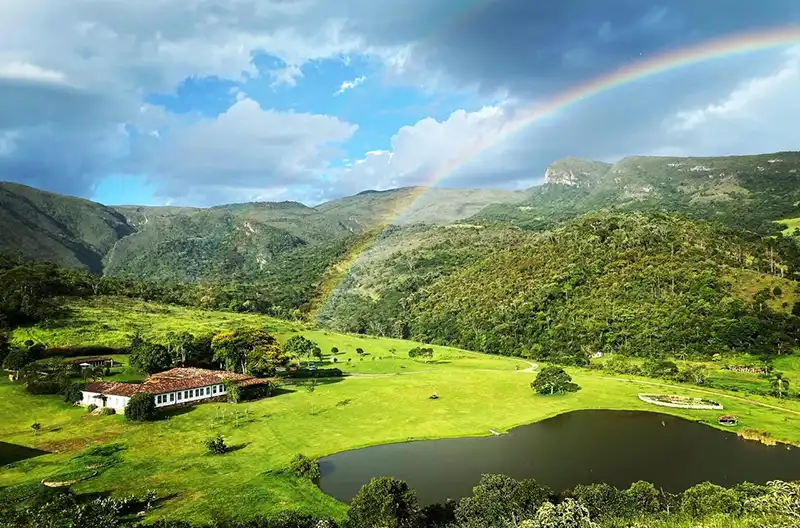
In 1982, Ibiti Projeto was born. That year, degraded land around the Ibitipoca State Park began to be bought up. Little by little, nature regained its place and the project transformed lives. Now, 43 years later, that dream has come true and is winning over people from all over the world. To celebrate Ibiti Day and Muriqui Day, both celebrated on August 27, we've put together excerpts from testimonies that capture the feelings of those who know this regenerating territory. We travel to belong, not to consume "I've just returned from a week-long immersion in Ibiti Projeto, in the heart of Minas Gerais, Brazil. Ibiti reminded me why we travel: to belong, not to consume. Mountains and springs. Farm-to-table. Laughter at long tables where locals and travelers exchange stories about life, nature and the meaning of things. A school that teaches purpose by living it day by day. Rewilding of 6,000 hectares. Endangered species reintroduced. An immersion in nature that heals and transforms. Art that empowers nature; and nature that empowers art. A model that shares ownership, so that the value remains with the people and the place. My reflections in three words: Flow. Abundance. Purpose. This is not hospitality as usual. It's regeneration in essence - and it works. I'm proud to support the Ibiti Project with Regenopolis: bringing the world to Ibiti, and Ibiti to the world." Ibiti is too good! To put it this way, the way we're used to in the region, Ibiti today has become a special corner of Minas Gerais, close to the Ibitipoca Park. There are 6,000 hectares! That's enough for four Ibitipoca Parks or more than 8,000 soccer pitches! And there are lots of animals here again: muriqui, jacutinga. We really look after nature and also grow over 100 types of food, all organic! It also gives local people the chance to work, learn and sell their products. It's the land of Seu Nilo, who saw the village resurface; of Janice and Gabriel, who chose to raise their family in the community; and of foreign visitors who take this little piece of Brazil into their hearts. There's specialty coffee, sweet strawberries, sunflowers, lavender, philosophy and spirituality. There are trails, waterfalls, a lake, good food, art and lots of nice places to stay: houses on the top of the hill, in the village and on the farm. Anyone who arrives can immediately feel the atmosphere: it's about taking a deep breath and renewing yourself, leaving lighter and happier. This is my life "This project has been a glory. Not just for me, but for other families who arrived, who needed it. Rafael, others... Because before, there was very little work here. Sometimes there was work, sometimes not. We'd walk 8 kilometers, 10 kilometers, in the rain, in the sun, to plant crops. There were no jobs, nothing. You have to be grateful. How many families are being supported by this project? Today I feel like I'm a different person. I talk to a lot of different people. This is therapy for me. This village, this project has practically become a family to me, because, come morning, I'm already inside. I have the privilege of not spending money on transportation to work, I can have coffee and lunch at home. There's nothing that can repay that."
Meet Muriqui Land: Ibiti's regenerative Land Rover
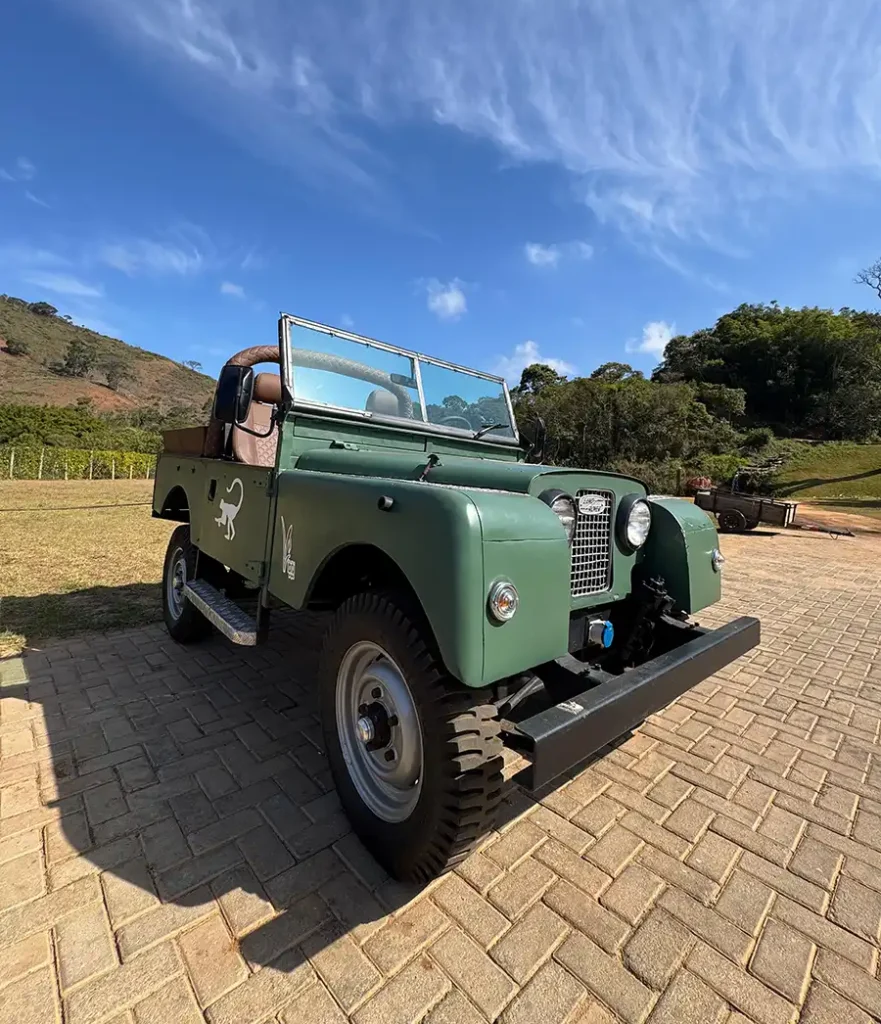
A classic from 1954, transformed into a symbol of innovation and regeneration. This is how the Muriqui Land was born, the Land Rover Series I fully electrified by Ibiti, which will make its public debut at the 24th Juiz de Fora Antique Automobile Meeting (August 28-31, UFJF Campus). The name is a play on words with Land, present in the brand and meaning 'earth' in English. Thus, the car was named Terra dos Muriquis, in honor of the largest primate in the Americas and a symbol of resistance and regeneration in Ibiti. "We seek innovation and disruption, but always with respect for our origins. Muriqui Land is an example of how we want to relate to nature in a sustainable and regenerative way," says Hugo Cambraia, CEO of Ibiti Projeto. Value in what remains The model is a reflection on how even a 70-year-old classic can be reborn with clean energy and, redesigned, be ready to last another hundred years. The forerunner of the modern Defender, the 1954 Land Rover Series I is a milestone in the British manufacturer's history. Inspired by the American Jeep and produced in aluminum due to the post-war shortage of steel, the vehicle stood out for its robustness and versatility. In 1954, the seven- and ten-seat station wagon versions arrived, consolidating its reputation for durability and reinforcing its status as a world icon. At Ibiti, this durability is celebrated as a fundamental principle. "By recycling this vehicle, we strengthen the idea that the old can be given a new lease of life, without discarding what is valuable," explains Hugo. That's the spirit: valuing the durable goods of the past and resisting the logic of programmed obsolescence and the rampant consumerism that turns everything into disposable. The classic Land Rover shares space with other relics that tell stories in Ibiti: an 1874 Steinway piano in rosewood, an attraction at the Gaia Café; and an airplane from the 1940s. Renato Machado, one of Ibiti's creators, points out that this philosophy is connected to a Japanese inspiration: the term Mottainai expresses deep respect for what is taken from the Earth and condemns waste. "In Japan, for example, some people restore a broken plate with gold, to show that, when recovered, it can be worth more than a whole one. The piano, the airplane, the Land Rover... these are icons that prove that humanity once knew how to produce things that lasted. Our role is to honor that tradition and show that we can do better." The challenge "It was a great challenge to electrify such an old Land Rover without losing its identity," says Hugo. The project was carefully coordinated by his grandfather, Maercio Alcântara, 81, who has more than six decades of experience in heavy machinery and mechanics. He accompanied every detail of the restoration at the invitation of Renato Machado, who bought the vehicle and entrusted his long-time partner with the mission of bringing this relic back to life. "I dismantled everything. I took out the engine, gearbox, transfer box... and reassembled it, now with the electric 'heart'. I kept the originality where I could, but brought modernity where it was needed," says Maercio, proud of the final result after around 120 days of work alongside the team from the Hidraumática workshop in Juiz de Fora (MG). Before After A classic that breathes future The Muriqui Land preserves the essence of a 1950s Land Rover - robust, versatile, charismatic - but with a regenerative soul. The original combustion engine has been replaced by an imported, silent, zero-emission electric powertrain. "We eliminated the central tunnel in the body, which previously housed the gearbox, and the floor became flat. This made room for another seat in the front. Today the car seats a total of nine people," explains Maercio. History in every detail Nothing escaped Maercio's careful craftsmanship. He even attended Land Rover events in search of references and even redesigned a special Land Rover logo for the steering wheel, a detail that reveals the level of personalization. Muriqui Land Technical File (Land Rover Series I, 1954)
Coexistence: Oca do Ibiti becomes a gallery with photo exhibitions and models
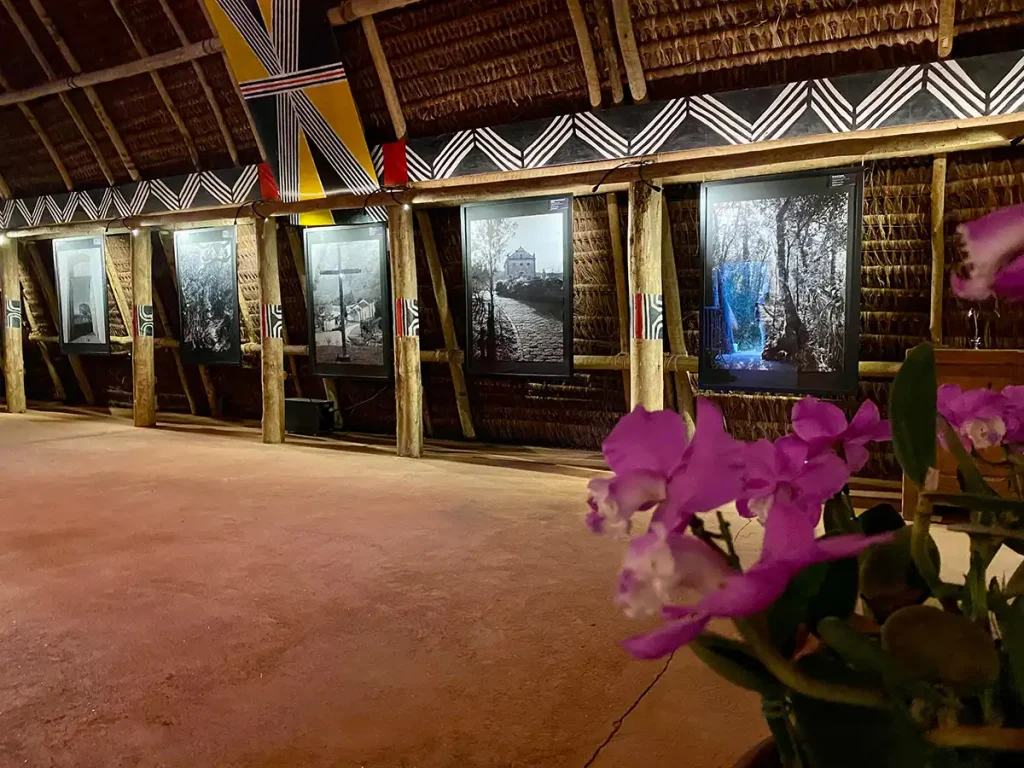
What commitments do we make to regenerating the world we live in? On display at the Oca do Ibiti for an indefinite period, the exhibition "Coexistence - Constructions, Cultivation and Regeneration" invites us to reflect on the connection between human beings and nature, showing how we can coexist with the world around us. Through the sensitive photographs of Marcio Brigatto and the handmade models of architect Luiz Antônio Saraiva Campos, or Tziu, the exhibition weaves a narrative about the interaction between human beings, their constructions and the regeneration of the natural world, in scenes of life in Vila Mogol and Ibiti Projeto. "The regeneration of nature also reflects human regeneration. The scenes captured by Marcio dialogue with the organic constructions of Ibiti, marked by simplicity and so well represented by Tziu's models. This encounter between the sophisticated and the ancestral, between the planned and the spontaneous, presents a rich and contrasting universe," says Heliane Machado, who wrote the show's text and worked on the conception of the exhibition alongside Regina Machado and Raquel Salgado, both from the Lagar Arquitetura office, responsible for the exhibition project. Exhibition celebrates harmony between architecture and nature At the opening, which took place on August 9, nature was represented by the beautiful bromeliads, orchids and other plants from Ibiti Orquídeas, owned by entrepreneur Guilherme Salgado, who runs the Ibiti nursery. The atmosphere of poetry, mining and many stories was completed with live music from the Olho d'água duo and the screening of the documentary "Lembranças do Mogol", which brings together testimonies from former residents. With the hard work and dedication of the Ibiti team, in a few weeks the Oca do Ibiti was transformed into a gallery, adding more content to the multifunctional space, which hosts events and accommodations for groups. Credits Service Oca do Ibiti, at the end of Vila MogolOn display indefinitelyAccess for Ibiti guests Project Find out more About the exhibition https://ibiti.com/coexistencia/ About the oca https://ibiti.com/oca-do-ibiti-tradicao-cultura-e-natureza-em-harmonia/ About models https://ibiti.com/arte-em-maquetes-sustentaveis/
Maned wolf gives birth to two cubs in Ibiti
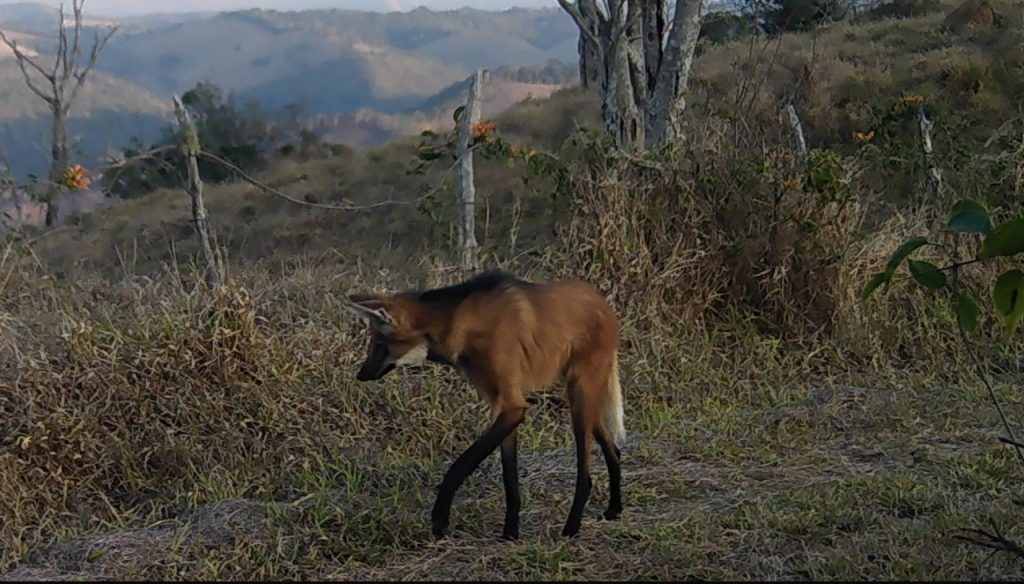
A rare and exciting scene took place in Areião, inside Ibiti: a female maned wolf gave birth to two pups in the wild. The fact, reported by a local resident who spotted the animals, is cause for celebration and reinforces the importance of conservation efforts in protected areas. We still have no records of the cubs. The image illustrating this article was taken by an Ibiti Projeto trap camera, in Areião, at another time. Although it doesn't show the birth, it is a real record of a maned wolf roaming the area. Choosing this regenerating territory as a shelter and nursery is, in itself, a sign of trust. The maned wolf, the symbol species of the Brazilian Cerrado, is considered an indicator of environmental health: it only stays and reproduces in balanced and preserved environments. "It's a gift from nature and a milestone for everyone working to regenerate this ecosystem," says Clariane Maranho, from Ibiti's Regeneration Department. "But it's also a moment that demands attention and respect: because she's with cubs, the female can adopt more protective behavior, which is natural in any species." How to act when you spot a maned wolf An endangered species, the maned wolf plays a vital role in the ecological balance, helping to control populations of small animals and dispersing seeds wherever it goes. Its survival depends directly on the conservation of its habitat and respectful coexistence with humans. May this new generation of wolves remind us once again that caring for nature means caring for the future of us all.
How the Statues got to Ibiti
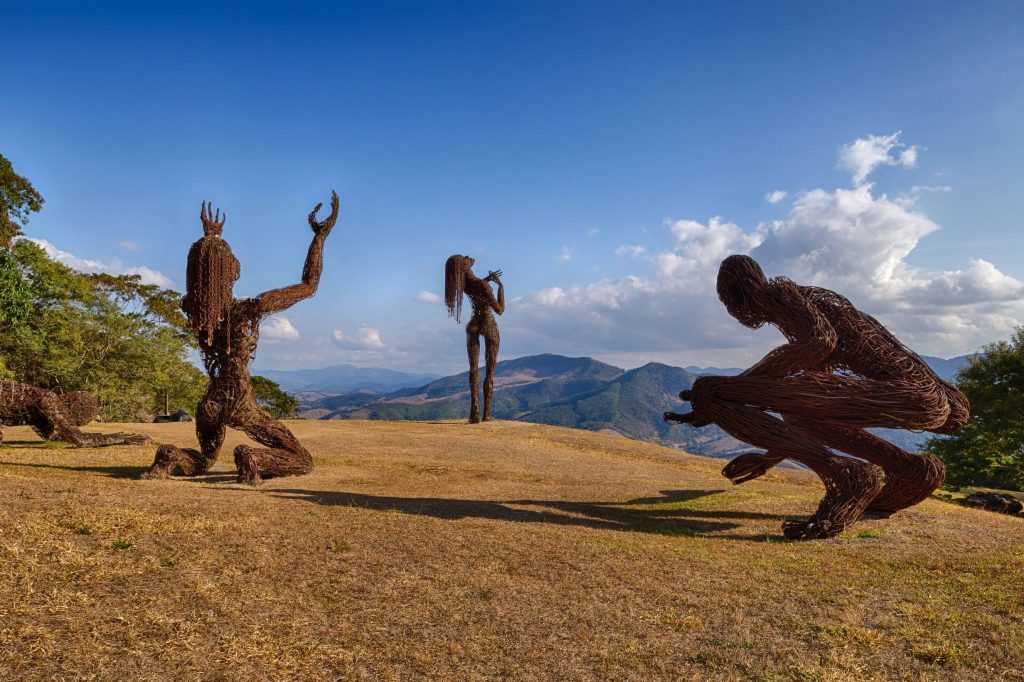
"I never imagined, not even in my wildest dreams, that they would come to a place like this. I'm very happy to be here with them," says artist Karen Cusolito on her most recent visit to her work, in 2022, at Pedra do Tatu, where her Big Family, known simply as the Statues, "live". This record can be seen in "My Big Family - Revisited", an 18-minute mini doc available on Ibiti Projeto's YouTube channel. Crossing oceans In between Karen's speeches, the film, directed by Mauro Pianta, also shows how the Statues made their way from California (USA) to Ibitipoca (MG) in 2014. The images were taken by Felipe Scaldini, director of another film, "Migration", which documents this journey in detail, also available on the Ibiti Projeto YouTube channel. Transportation from the Pacific to the Atlantic was no easy task, as Renato Machado recalls. Founder of Ibiti, he found out about the work when he was passing a shed: "I had suggested cutting the sculptures and then casting them here, with a specialized and reliable team. But then Karen said to me: 'Renato, you're not going to cut up my children, are you?' And she herself helped to make some 'beds' to lay the statues on, which came on the ship in one piece. To get them up to the top of the mountain, we had to open a road for the tractor to pull up with the crane, and then we closed it and planted them on top." A destination Karen made a point of getting to know the place where the Big Family would be moving. "I wanted it to be a destination, not an obvious place like next to the Pousada do Engenho. So I suggested three places, hoping for this one, which she also liked. Then she did three layouts and asked me to choose one, and again we agreed," says Renato. For him, the work took on a new meaning when it came to Minas. "It's an artwork very much in line with our project, because it's recycling, it's garbage that has been transformed into something better, a 'regeneration'. And it's certainly art made with steel that left Minas Gerais, had its use on the planet and came back here, because our state is a major supplier of ore to the world." Feeling translated Karen Cusolito took around three years to complete the work and presented it in 2007 at the Burning Man Festival in the United States. At its center was an oil derrick, representing the god of today. "The intention was to show our ambition for oil and how it impacts on the economy and environment of almost every culture around the world." Karen made art installations in Boston until she moved to San Francisco in 1996. There, she runs American Steel Studios, a huge warehouse in the suburb of Oakland, where more than 200 artists and creative entrepreneurs work. It was there that, over the course of a few years, she created the set of sculptures. About the strong presence of the human body in her sculptures, the artist comments: "The human form is a rich arena for exploring and expressing emotion, intention and challenge". Most of her work focuses on humanity and the environment and "the delicate balance between the two". Get to know the meaning of each sculpture ACHMED Represents the Muslim part of the world. It connects to the Earth with humility and devotion MUMBATU Slender and strong, it refers to African traditions. By sowing, it suggests the partnership between human beings and nature ECSTASY It seems to be in movement and, according to Karen, is "something of a hippie, sun worshipper, in joy with nature" EPIPHANY In a moment of enlightenment, it represents clarity, joy, the appreciation of life PASSAGE It shows creativity and tradition being passed down from one generation to the next: mother and child walk together HUMBLE GEORGE The knight, in a posture of acceptance, reflects calm, the Christian faith
Café Gaia: the regenerative taste straight from Ibiti
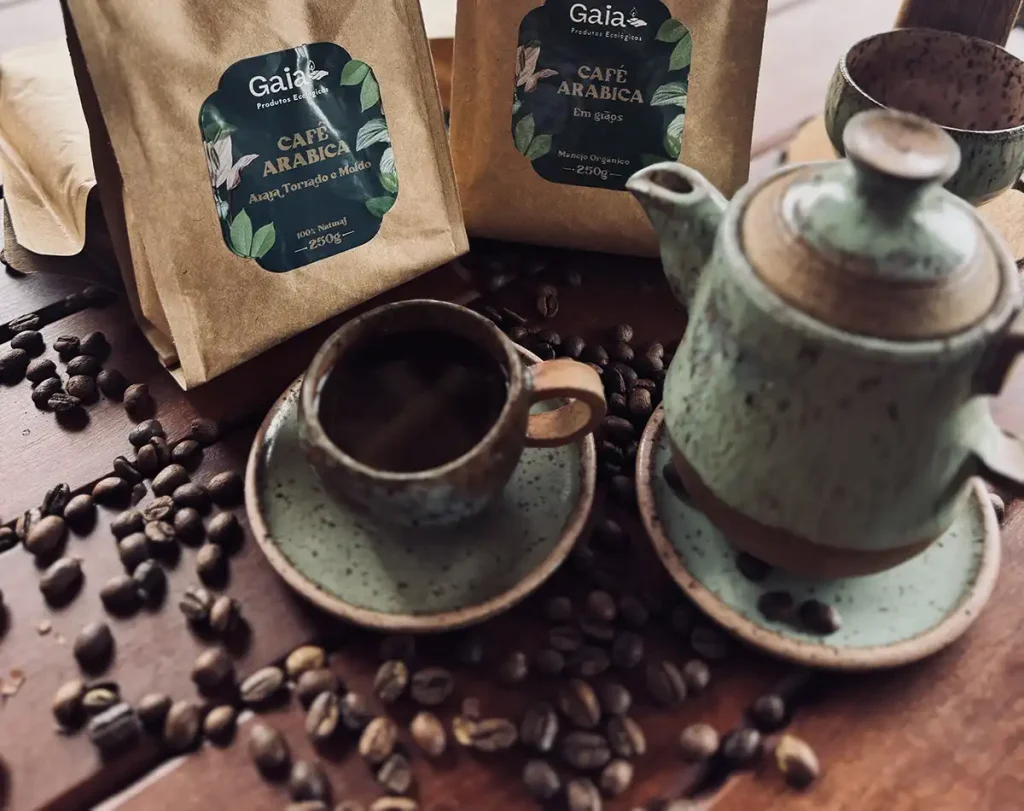
Anyone who has a cup of coffee at Ibiti Village isn't just enjoying a drink. They are savoring a story of caring for the soil, respecting biodiversity and valuing artisanal work. Produced by Gaia Produtos Ecológicos, Café Gaia is an example of regenerative coffee. Grown organically, it represents the meeting of excellence and sustainability. Local production: from bean to cup Café Gaia is produced on Ibiti's land, in an area of transition between the Atlantic Forest, Cerrado and Rupestrian Fields. There, agronomists Gabriel Barbosa and Janice Ventorim, masters in organic farming, conduct each stage with technical rigor and passion. From planting to the final roasting, everything is done with attention to the environment and the quality of the grain. "Harvesting is done by hand, only with ripe fruit, and the coffee is dried on a covered patio before going through the monjolo and controlled roasting. It's a natural and artisanal 100% process," explains Gabriel. Two varieties of Arabica coffee are grown: Arara (already in production) and Geisha (planted in 2025, with the first harvest scheduled for 2029). The climate, altitude and environmental protection contribute to Café Gaia's unique sensory profile - balanced, aromatic and full of personality. Respect for the soil, biodiversity and taste For Janice, in addition to organic management, Café Gaia's biggest difference is the fact that it is grown in Ibiti. "It's not just any coffee. It's grown in the Ibitipoca region at an ideal altitude for Arabica coffee and protected by an area with 96% of regenerating native vegetation. This has numerous benefits for the final quality of the coffee." According to the agronomist, taking care of the environment in which it is produced is one of the reasons why organic farming is easier. "The native vegetation favors biodiversity and the presence of natural enemies that fight any pests. That's what sets us apart." A warm break in winter: cappuccino with Café Gaia To celebrate Sustainable Gastronomy Day (June 18), established by the UN, and to warm up the cold days in the mountains, the Gaia Café team has prepared a special cappuccino recipe with Café Gaia, ideal for enjoying winter with flavor and environmental awareness. Cappuccino recipe Ingredients: Directions: Sustainable gastronomy starts with conscious choices Café Gaia is an invitation to rethink the way we eat and relate to nature. By choosing an organic, local and regenerative coffee, you support sustainable agricultural practices, strengthen communities and contribute to a more balanced future. Find out more: @ibiti_gaia @ibitiprojeto Ibiti.com
Ibiti Travessia: Six days of e-bike, nature and inner reconnection
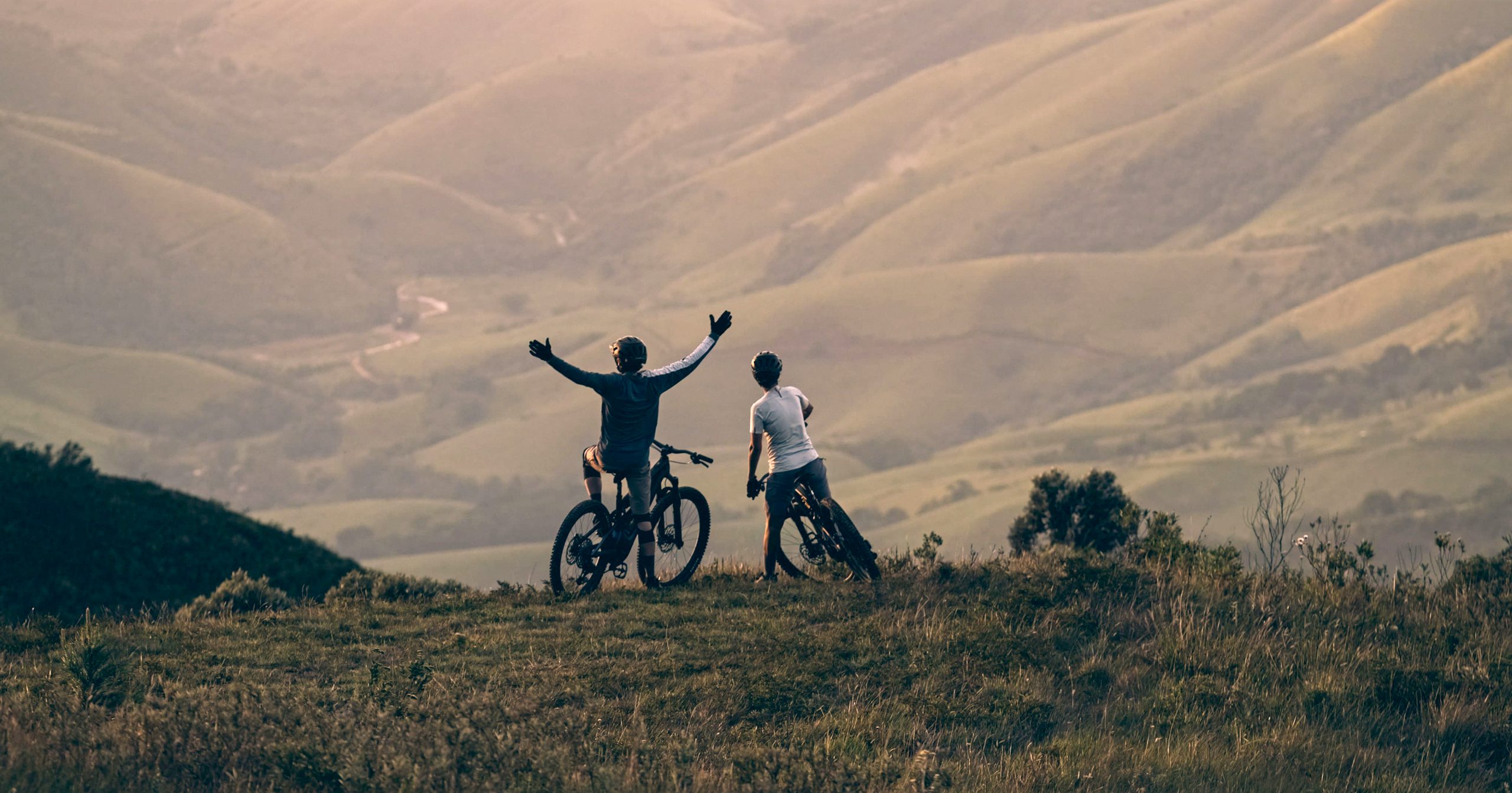
It's in the middle of the road that life happens. When your feet feel tired and your soul begins to expand. Ibiti Travessia is not just an electric bike ride. It's a plunge into the immensity of time, nature and self-knowledge. Six days and five nights of adventure, contemplation and passage. As with the great routes of humanity - from the Camino de Santiago to the trails of the Andes - here too you cross more than a landscape: you cross inwards. A journey in three stages With a total length of approximately 100km, the Ibiti Travessia takes travelers through three different forms of hospitality, connecting them to different rhythms. It begins at Engenho Lodge, where sophistication meets the memory of an ancient time. There, on the farm that has become a refuge, comfort is an invitation to rest and adventure. The Raízes Spa, the trails through the Statues, the Water Circuit and the climb to Isgoné - Ibiti's highest point - prepare body and spirit for what's to come. On the third day, the road beckons. On two wheels, travelers set off for Areião, where simplicity imposes itself like an unexpected luxury. It's 25 km between waterfalls, mountains and the historic Boa Vista Farm, with a stop at the Asas project, dedicated to rescuing wild animals. At Areião, time slows down. The late afternoon light gilds the quartzite sands, and silence becomes a dwelling place. Here, everything is reduced to what is essential - and, because of this, everything expands. The last destination on the journey is Ibiti Village, where the spirit of the Mogol village pulses. Two days of a different kind of immersion: the simplicity of a village, life taking its course without haste. The Waterfalls Circuit, the bike trails, the Chapadão viewpoint. At the Yucca restaurant and Gaia Café, the cuisine reflects the care and respect for the earth's ingredients. On the sixth day, a final dip in the calm waters of Lago Negro, a visit to Muriqui House - a project to preserve the northern muriquis - and the certainty that every step taken in Ibiti was also a step inwards. Beyond the trails: the essence of Ibiti Travessia Bruno Reis, a guide in Ibiti for five years, grew up in the midst of these trails and never tires of walking them. "Each crossing is different, because each person arrives here with a story. And everyone leaves with something new." Among the points that most impress travelers, he mentions the Big Family - seven giant sculptures made from scrap metal by artist Karen Cusolito. "There are more than 40 tons of iron and steel at the top of Pedra do Tatu. The 4km hike up there is already worth it, but when you arrive and see those giant statues looking down at you... it's a remarkable experience." And it's not even the "toughest" trail, according to Bruno. Of all the hikes, the one that leads to Isgoné, Ibiti's highest point, is the one that demands the most from tourists. "It's about 7.5km uphill, and then another 7.5km downhill, passing the Statues and the Water Circuit, where people enjoy the waterfalls," he says. But the physical demands don't scare those who face the adventures inside Ibiti, Bruno guarantees. "Those who do it really enjoy it and usually come back." "The idea is to combine the useful with the pleasant: the comfort of Ibiti's hospitality and outdoor activities. All of this in constant connection with nature," says entrepreneur Claudia Baumgratz, Travessia's creator and a born adventurer. "Travessia is an opportunity to experience each of these three lodging concepts, their respective accommodations and different styles of cuisine, as well as the main attractions throughout Ibiti. More than a tourist experience, the Travessia is an invitation to get lost and find yourself in the middle of the road. To leave behind what weighs you down and take only the essentials with you. What the Ibiti Travessia includes Ibiti Travessia day by day Book: (32) 98449-2200 - (32) 99984-7626 Find out more: Ibiti.com
Ibiti Retreats: When leaders reconnect with nature
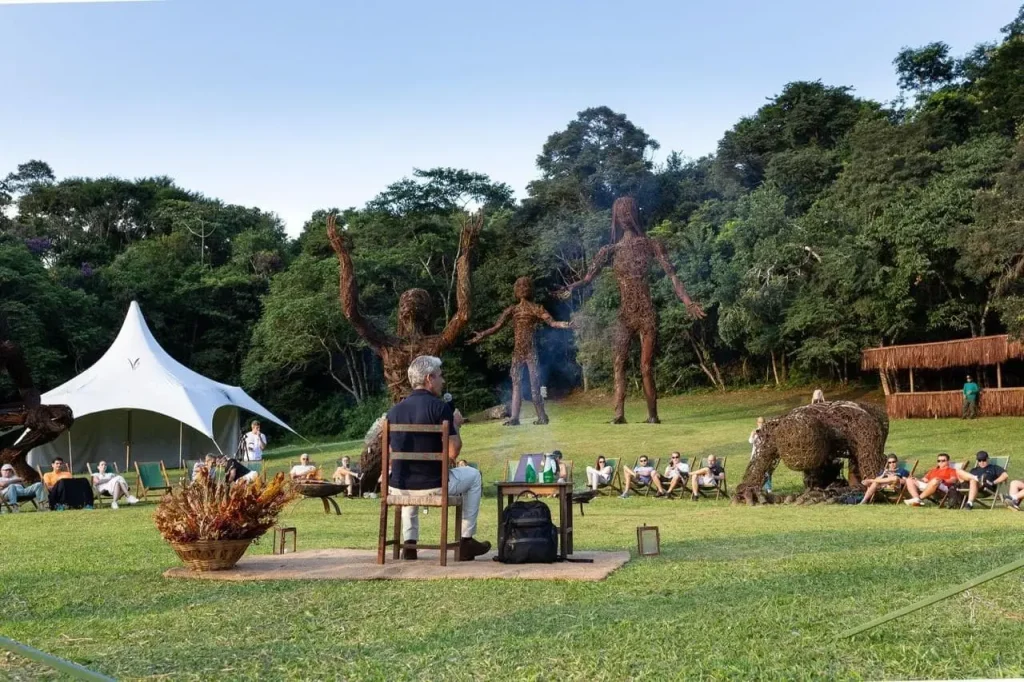
What can change when leaders and teams get away from the routine and immerse themselves for a few days in a territory of living, regenerated nature? Ibiti Retreats shows that the simple act of slowing down can be the key to a new way of leading, living together and innovating. More than a corporate retreat, Ibiti Retreats proposes a deep reconnection - with the earth, with the body and with the collective purpose. The experiences are tailor-made for business groups that want to transform their organizational culture from the inside out, in tune with the urgencies of our time: well-being, sustainability and meaning. "Nature is a powerful ally in the development of more conscious and healthy leaders. Our aim is to provide in-depth experiences that help regenerate not only the relationship with the environment, but also with work, with others and with oneself," explains Maíra Delgado, who is responsible for the retreats at Ibiti and for Comuniversidade, one of Ibiti's enterprises focused on events, courses and training. A new way of learning, integrating and regenerating Inspired by the principles of regeneration, the program is structured around four pillars that can be combined according to the objectives of each group. Each retreat is designed in a personalized way, combining regenerative practices with human development strategies and organizational culture. The programmes are organized around four pillars: 1. Regeneration of the Earth - ESG in practice Experiences in sustainability, belonging and connection with the territory: 2. Regeneration of the Self - Well-being and high performance Moments of care and deep listening to the body and mind: 3. Regeneration of Knowledge - Learning and innovation Exchange of ideas, experiences and knowledge: 4. Corporate Immersion - Strategic alignment and leadership Tools for building a more collaborative, creative and healthy environment: Retreat as reunion Ibiti Retreats does not offer ready-made formulas, but fertile spaces where each group can cultivate its own discoveries. The food is plant-based, harvested on the territory itself. The architecture is designed for silence and contemplation. And time here runs to the rhythm of nature - with softness, presence and depth. Because leading the challenges of the present requires more than efficiency: it requires sensitivity, vision and the courage to change. And sometimes it all starts with a pause in the right place. "Coordinating the Ibiti Vegan event is a huge privilege! Ibiti Projeto is such a magical place that it lets us dream of a possible utopia in which veganism plays a fundamental role. The connection with nature and the energy of the place create the ideal environment to engage international leaders of the vegan movement in this annual gathering and generate real impact." - Alex Soderberg, co-founder of Naveia "Holding the immersion of our integral health course - Rise to Shine, from NOS Escola, in Ibiti is always very enriching. Ibiti is a living example of our philosophy. The values, the socio-environmental projects, the energy of the place, nature, the genuine connection between people... everything there enhances learning, making each edition even more special." - Anna Elisa Castro, chef, health coach and founder of NOS Escola An invitation to transformation The Ibiti Retreats experiences are open to companies from different sectors and of different sizes. The programs vary in length and take place in Ibiti - a territory that borders the Ibitipoca State Park and combines environmental regeneration, social innovation and hospitality. Ibiti Retreats Regenerative experiences for leaders, teams and organizations. Schedule a chat with the curatorial team, contact us. 32 99108-7162 Learn more Corporate Events
Ibiti on the Green List 2025 of British magazine Wanderlust
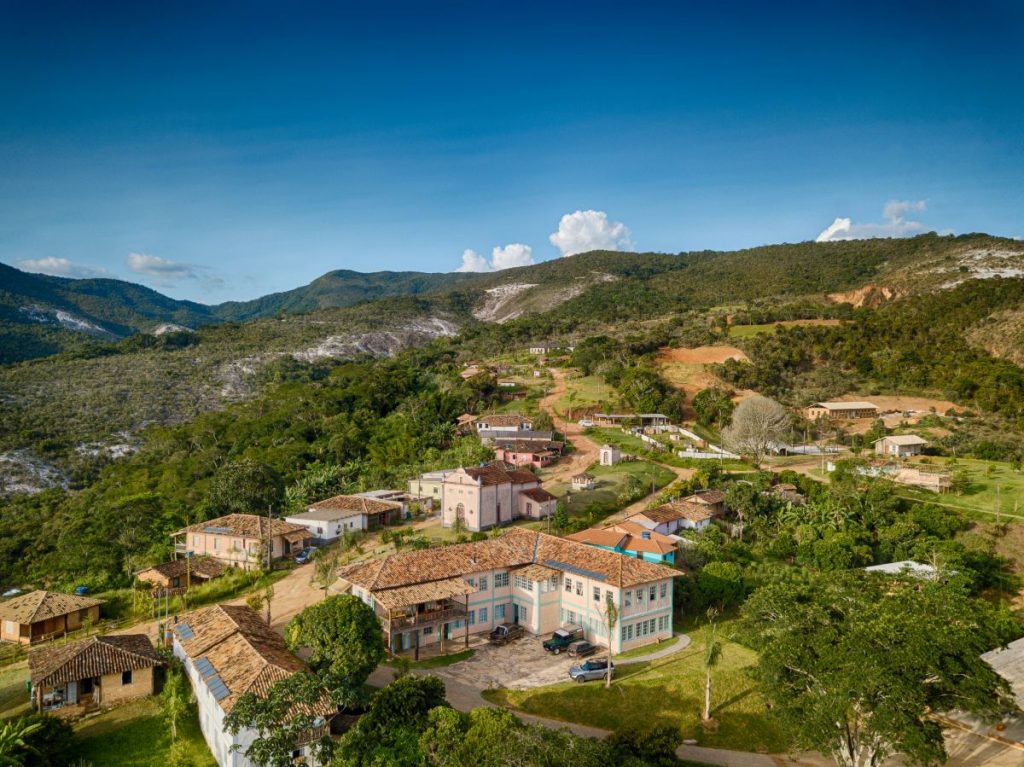
The small town of Mogol, in Minas Gerais, has just earned a prominent place on the international scene by being included on the Green List 2025 of the British magazine Wanderlust - a respected travel publication. The list recognizes tourist destinations committed to sustainability, environmental regeneration and a positive impact on local communities. A mining town reborn through regeneration High in the mountains and marked by a past of emptying, Mogol, a district of Lima Duarte, in the Zona da Mata region of Minas Gerais, has seen its history transformed with the arrival of Ibiti Projeto. In addition to areas degraded by decades of intensive use, many of its younger residents had migrated to the cities. The scenario began to change with Ibiti Projeto's socio-environmental initiatives, which aim to regenerate the landscape, reconnect fragments of the Atlantic Forest to the Ibitipoca State Park and revitalize the social and economic life of the village. Today, Mogol is an example of rural reoccupation based on values such as hospitality, sustainability and innovation, and is home to sustainable, high-standard, solar-powered lodgings, a vegetarian farm-to-table restaurant, programs for employees and villagers, and cultural and environmental events that bring human beings into contact with nature and creative freedom. Why was Vila Mogol chosen? Wanderlust magazine highlighted Mogol for its regenerative transformation: from depleted territory to an example of conscious tourism and community development. Projects such as the reintroduction of native species, the use of regenerative architecture and the promotion of cultural experiences with a positive impact ensured its presence on the list. The tourism that is developed in the region today contributes directly to the preservation of nature and the creation of local jobs and opportunities. What is the Green List? The Green List, published annually by Wanderlust, selects destinations around the world that stand out for their effective actions in terms of environmental sustainability, cultural authenticity and positive social impact. The selection is made through a vote by the magazine's readers and expert curators. In addition to Vila Mogol, those selected for the 2025 list range from the urban regeneration of Pittsburgh (USA) to community tourism practices in Peru and the sperm whale sanctuary in Dominica, in the Caribbean. International recognition with local roots The inclusion of Vila Mogol on the Green List is a milestone for regenerative tourism in Brazil. It shows that small communities, when they combine vision, action and respect for nature, can inspire the whole world. "For us, it's recognition that a sustainable future is not only possible, but is already underway. Being on this list gives us the certainty that we're on the right track and reinforces our responsibility - it's a sign of our commitment to the future of the planet." Hugo Cambraia, CEO of Ibiti Projeto Learn more Check out the full list of Green List 2025 members in the Americas Learn more about Mogol
Mogol: Where does the name of the Minas Gerais town that won the world come from?
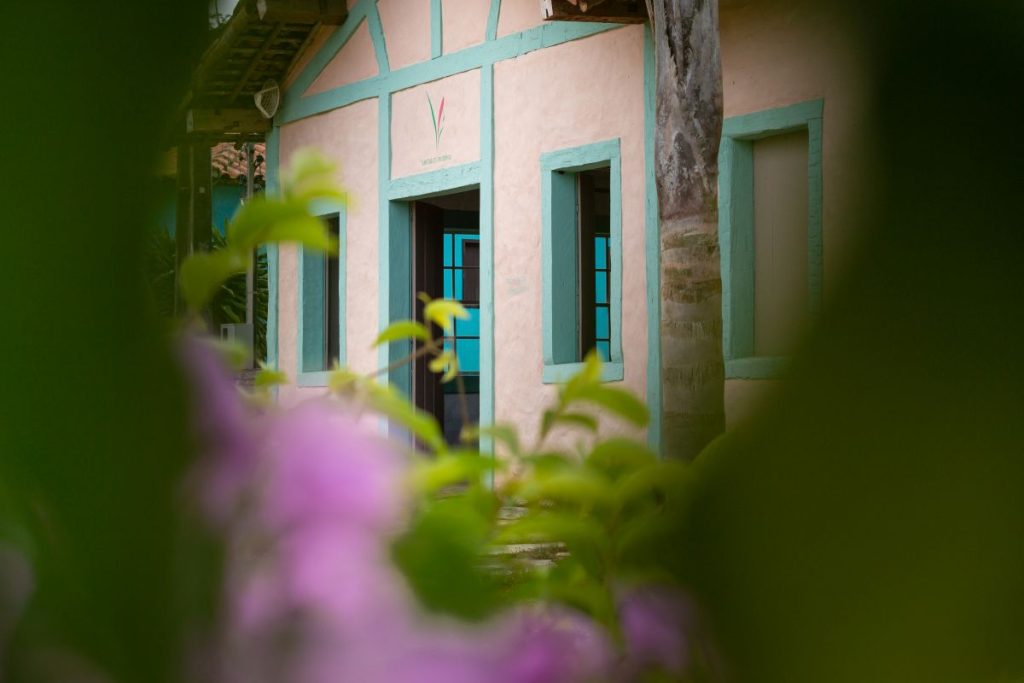
Everyone who hears about Vila Mogol immediately wonders where the peculiar name comes from. The small town, located in the municipality of Lima Duarte (MG), has stories dating back to the 18th century, when the region was still at the height of gold mining. Its name, however, remains shrouded in mystery. It is most likely that Mogol inherited its name from the Grão-Mogol River, which rises on the edge of the Ibitipoca State Park and flows into the Rio do Peixe. But why was this river named after it? Although there are no definitive records, there is a curious hypothesis: the name may be a reference to the Mughal Empire, a dynasty that ruled much of the Indian subcontinent between the 16th and 19th centuries. In colonial times, it was common for foreign and exotic names to be used to baptize localities, either because of the influence of the Portuguese colonizers or because of a mere fascination with distant lands. Thus, it is possible that the Grão-Mogol River received this name, which in turn gave rise to the town's name. The town of Mogol stands the test of time Mogol arose as a result of mining, but like so many other towns of the period, it was almost abandoned as time went by and economic activities changed. Its first houses were built around 1780, and the region was even described in historical documents, such as the report by Corporal José Delgado Motta. However, over the centuries, with no opportunities for young people, the village came to have fewer than ten residents. The documentary "Droba pra lá", by Felipe Scaldini (2012), portrays this period of discouragement, showing the few inhabitants who still resisted the rural exodus. In recent years, Mogol has begun to be revitalized. Since 2017, a movement to buy and restore houses has brought new life to the village, which is home to Ibiti Village - one of Ibiti Projeto's lodging concepts, where you can live the experience of "living" in one of the little houses with all the comfort and coziness and interact with the community. The relationship with the local residents was built on respect and closeness, and today most of them have direct ties with Ibiti Projeto. One example is Seu Nilo (Antônio Nilo), born and raised in the region. Known as the "guardian of Mogol", he takes loving care of every garden and flowerbed that embellishes the place. In general, the village is quiet, with around 25 residents - more than 40 if you count the surrounding areas, such as Baixo Mogol, Colônia, Grotão and Tapera, as well as the employees who have come from outside to work at Ibiti. But there are times when the quiet routine gives way to movement and festivities: days of mass (on the last Sunday of the month) and popular celebrations. The faith that unites the community In the center of the village, the Church of Nossa Senhora dos Remédios stands out as a historical and religious landmark. Built in the 18th century as a small chapel, it was enlarged over time. In 1885, Mr. Francisco Antônio de Paula rebuilt the original chapel and, in 1917, Antônio José Rodrigues carried out a major renovation, financed by donations from the community and the sale of land. He also incorporated an area of approximately eight hectares, donated by Chico Marculino, into the church's assets. As well as its simple and charming colonial architecture, the church has a curious legend. It is said that a wanderer arrived in Mogol carrying a stone image of Our Lady of Remedies. He used it to beg, going from house to house. Antônio José Rodrigues acquired the image and started a fundraising campaign to renovate the church, making the saint the main object of devotion in the village. Today, the church maintains its main altar and two side altars dedicated to São Sebastião and Nossa Senhora de Fátima. The wooden altars, painted in blue and white, reveal valuable craftsmanship, mixing colonial, Moorish and Roman influences. Listed by the Lima Duarte Municipal Deliberative Council for Cultural Heritage in 1998, the church and its collection - including sacred images, implements and documents - are preserved as part of the local identity. Tradition and belonging Mogol may be small, but its strength comes from faith and stories that have stood the test of time. Among the residents, Seu Miguel, the village's blesser, keeps the tradition of cures and blessings alive, just as he learned from his father. "I bless with the rosary. People come from outside, children come, people from the village... Mogol is cool, it's important. There are lots of people. It's even livened up the place." At 67, he still remembers the days when he used to carry firewood and raise pigs. Today, he lives alone in the little pink house next to the Casa Freud guesthouse, but is visited by his brother Zé Dica and his relatives, who live next door. In his backyard, he grows cabbage and onions. In Mogol, life goes on at its own pace. A village reborn, recovering its roots and its essence. Reservations Center: (32) 98449-2200 Find out more: Ibiti.com @IbitiProjeto @IbitiProjetoHotels
Ibiti Kids: July vacation in nature for children and families
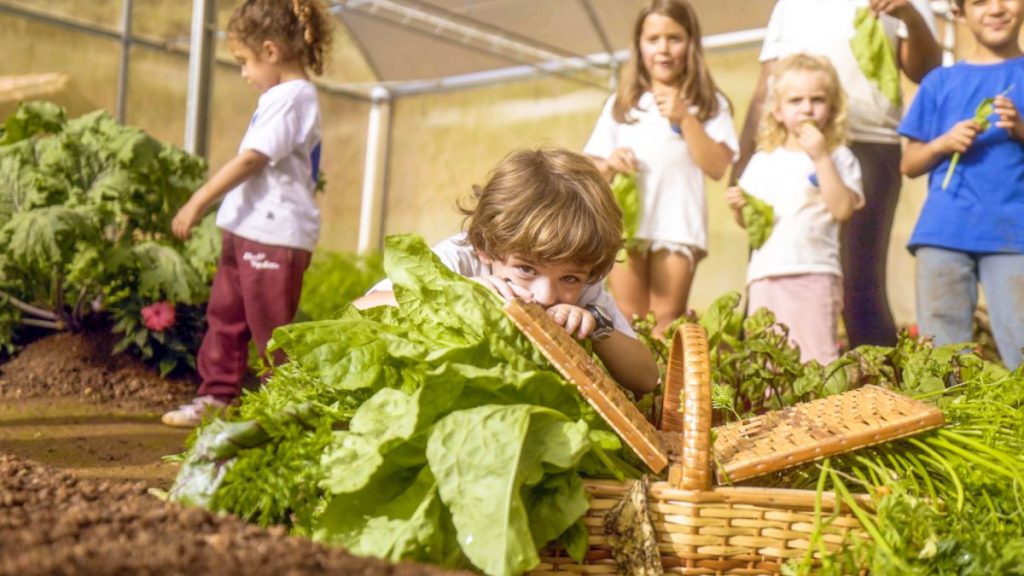
The July vacations are for children and their parents too! From July 17 to 20, Ibiti Village is preparing a special program for children up to 10 years old, in a magical and educational weekend that brings together nature, science, cooking and fun. Ibiti Kids is a light and enchanting immersion, designed so that the little ones can play, learn and connect with the territory in a playful and welcoming way. Book here! More than just fun, Ibiti Kids is about learning environmental education in practice. Each activity has been designed to raise children's awareness of the importance of contact with nature, preserving the planet and environmental regeneration - pillars that guide all of Ibiti's work. Outdoor activities during the vacations In Vila Mogol, children can play freely outdoors, among trees, orchards and flower gardens, discovering the world independently. The ibiti Kids program begins with lunch at the Yucca Restaurant and a warm welcome. Contact us for the full program! During the immersion, the children take part in an exclusive trail for little explorers, visit Gaia's vegetable garden for a garden-to-table experience and venture out on a variety of activities, ending with a lively Pizza Night at the Yucca Restaurant. And there's more! The stay at Ibiti Village includes: - Morning yoga for children - Children's cinema sessions at the Cine Mazzaropi - Visit to the Oca built by the indigenous people of Xingu - Activities on the beach tennis court - Heated swimming pool in the spa - Fitness room - Natural playground for children - Trails and waterfalls on the Mogol Water Circuit - Trip to the Ibiti Orchids Nursery Extra activities The activities are carefully organized, with the option of hiring additional trails and exclusive experiences, such as e-bike rides, horseback riding and the special visit to Muriqui House, where biologists guide the children to meet the group of muriquis that inhabit Ibiti and learn about conservation and rewilding - an unforgettable experience of connection with nature. Stay in a charming village integrated with nature The houses at Ibiti Village have a soul, a name and a history. With a variety of styles - from sophisticated rustic to regenerative contemporary - each accommodation has been designed to welcome, inspire and provide comfort with purpose. Books scattered around each room, large spaces and incredible views of nature, the mountains and waterfalls complete the experience. Among the highlights are: Ibiti: Regeneration, environmental education and unique experiences More than just a winter destination, Ibiti is an invitation to live in harmony with the environment. The project is a benchmark in environmental regeneration, the reintroduction of native species, waste reduction, organic production, solar energy and environmental education. The local community actively participates in the experience - and this is reflected in the genuine hospitality that welcomes each visitor. Book: (32) 98449-2200
Vegan taioba risotto by Mary, chef at Yucca restaurant
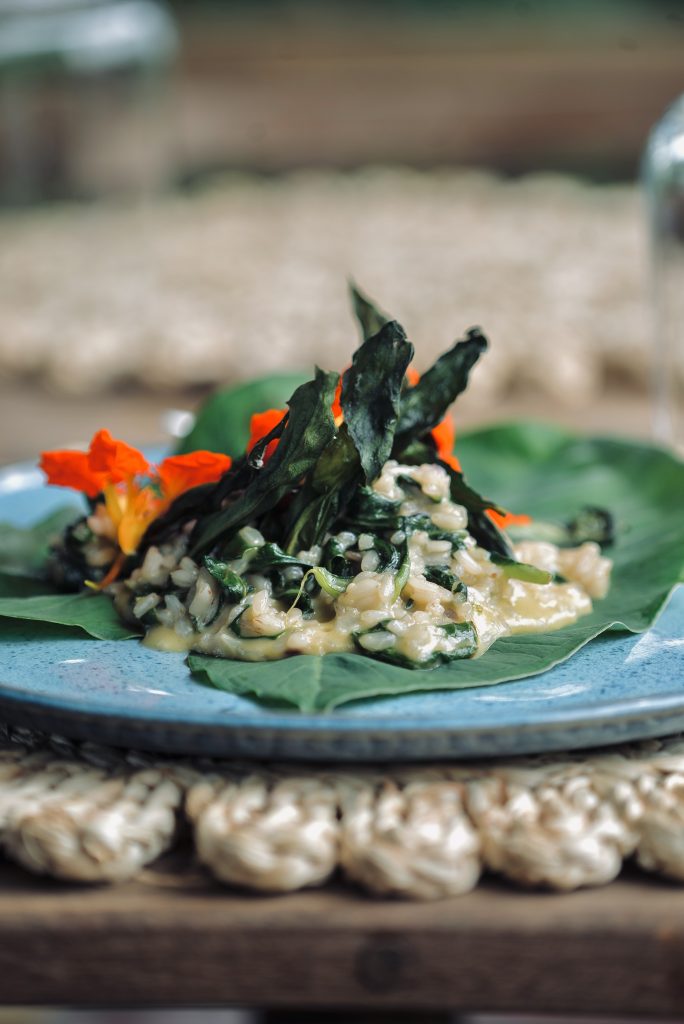
Get to know chef Mary's story and learn the recipe for taioba risotto with crispy ora-pro-nóbis, from the Yucca restaurant at Ibiti Projeto.
Winter in Ibiti: Days of warmth and well-being in nature
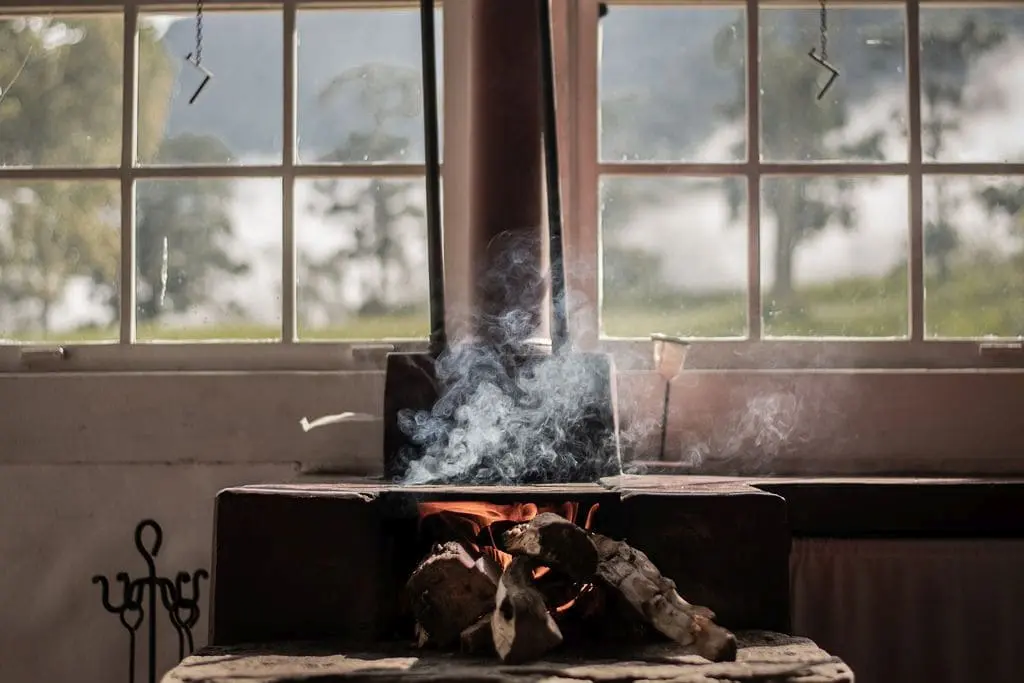
The winter season in Ibiti is packed with cultural, gastronomic and outdoor activities. All this amidst 6,000 hectares of preserved nature. Take advantage of the vacations and holidays in June, July and August and come and enjoy a program for couples, groups and families with children!!! Choose the best date and come! Highlights of the winter 2025 program at Ibiti Village Ibiti Arraiá (June 27-29) Tradition, flavors and joy Ibiti style Ibiti Kids Holidays (July 17-20) July is for the kids (and their parents too!) Accommodation in a charming village integrated with nature The houses at Ibiti Village have a soul, a name and a history. With a variety of styles - from sophisticated rustic to regenerative contemporary - each accommodation has been designed to welcome, inspire and provide comfort with purpose. They all have books scattered around each room, large spaces and incredible views of nature, the mountains and waterfalls. Among the highlights are: Luxury with purpose: regenerating is living better More than just a winter destination, Ibiti is an invitation to live in harmony with the environment. The project is a benchmark in environmental regeneration, waste reduction, organic production, solar energy and environmental education. The local community actively participates in the experience - and this is reflected in the genuine hospitality. In addition, Ibiti Village has: Also visit: Muriqui House Project A guided tour by biologists to get to know the group of muriquis that inhabit Ibiti up close and learn about conservation and rewilding. Big Family Statues See the set of giant sculptures made from recycled metal by artist Karen Cusolito, at the top of Pedra do Tatu. Why choose Ibiti this winter? - Because here you're not just a guest: you're part of a living village that takes care of the planet.- Because the program is authorial, personalized and transformative.- Because you breathe fresh air, learn, reconnect, have fun - and come back different.- Because winter here has soul, it has human warmth, it has purpose. Book now and experience a winter with soul Whether you're celebrating love, playing with your children or just taking a deep breath to rebalance yourself, winter at Ibiti Village is an invitation to (re)connect. Book: (32) 98449-2200 Ibiti.com
Revolution in Ibiti: An inner journey with Buddhism and music

Can you imagine an experience that goes beyond the physical and connects you to your deepest purpose? R.evolution Club and Ibiti Projeto have joined forces to create a transformative four-day immersion focused on reconnection, spirituality and integral well-being. A revolution in Ibiti. From April 3 to 6, amidst the preserved nature of Ibiti, this experience will bring together the renowned Buddhist master Khenpo Samdup Rinpoche and the medical music duo Emanazul, in a welcoming and inspiring environment, where time opens up for what really matters. This is a journey of living together, listening and being present. An invitation to: ✨ Breathe more lightly and allow yourself to pause, contemplate and simply be.✨ Participate in a community that shares values and walks together towards regeneration.✨ Nourish yourself with the surrounding nature, feeling the silence and regenerating power of Ibiti.Experience moments alongside Khenpo Samdup Rinpoche, absorbing the wisdom of Tibetan Buddhism through his presence, reflections and inspiring conversations.✨ Listen to Emanazul, a medical music duo that invites you to listen, be present and feel. "We believe that being in contact with auspicious people and places has the power to elevate our journey. This immersion is an invitation to nourish ourselves spiritually with wisdom, connection and presence - opening up paths to an even fuller and more conscious life." Luiza V. Figueira de Mello, founder of R.evolution Club and organizer of the event The union between R.evolution Club and Ibiti Projeto marks the beginning of a movement that intertwines individual and collective regeneration with innovation and purpose. Are you ready to experience your own revolution at Ibiti? Meet the facilitators KHENPO SAMDUP RINPOCHE Khenpo Samdup Rinpoche is a renowned master of Tibetan Buddhism, respected for his accessible and profound approach to the transmission of Buddhist teachings. He is a Khenpo, a title awarded to great scholars and teachers of Vajrayana Buddhism, and currently serves as spiritual director of the Gar Drolma Buddhist Center in the United States. A native of Tibet, he translates profound concepts of Tibetan Buddhism into a language accessible to Western audiences. His teachings are not just theoretical, but focus on how we can bring more peace, clarity and compassion into our daily lives. 🔗 Find out more: gardrolma.org/khenpo-samdupspiritual-director EMANAZUL: Music that heals and connects Formed by Nanala (Ana Clara Cenamo) and Renato Dias, the duo was born out of the desire to express, through music, the transformations and discoveries of a life dedicated to self-knowledge. Their songs move between medical music, mantras and Brazilian music, carrying an energy that invites celebration, introspection and self-remembering. Each song is born from the musicians' personal experiences, reflecting moments of introspection, spiritual discoveries and a deep love for nature and the sacred. A reference in festivals and meetings aimed at expanding consciousness, the duo mixes acoustic instruments, soft percussions and captivating vocal harmonies. 🔗 Find out more: www.emanazul.com.br About R.evolution Club R.evolution Club is a platform dedicated to human development, well-being and the expansion of consciousness. "We believe that the connection between body, mind and spirit is essential for a balanced and fulfilling life. We are subtle and technological. We are local support, we are a global village. We are the call for transformation. Our community brings together experts, therapists and seekers who want to evolve and transform." 🔗 Find out more: revolutionclub.com.br Schedule 03/04 - Thursday 04/04 - Friday 05/04 - Saturday 06/04 - Sunday Limited places! 📍 Sign up now and come and experience this journey of transformation! Registration: 21 98890-7080 Reservations Center: 32 98449-2200
Vedanta Ibitipoca Retreat: Self-knowledge and wisdom retreat
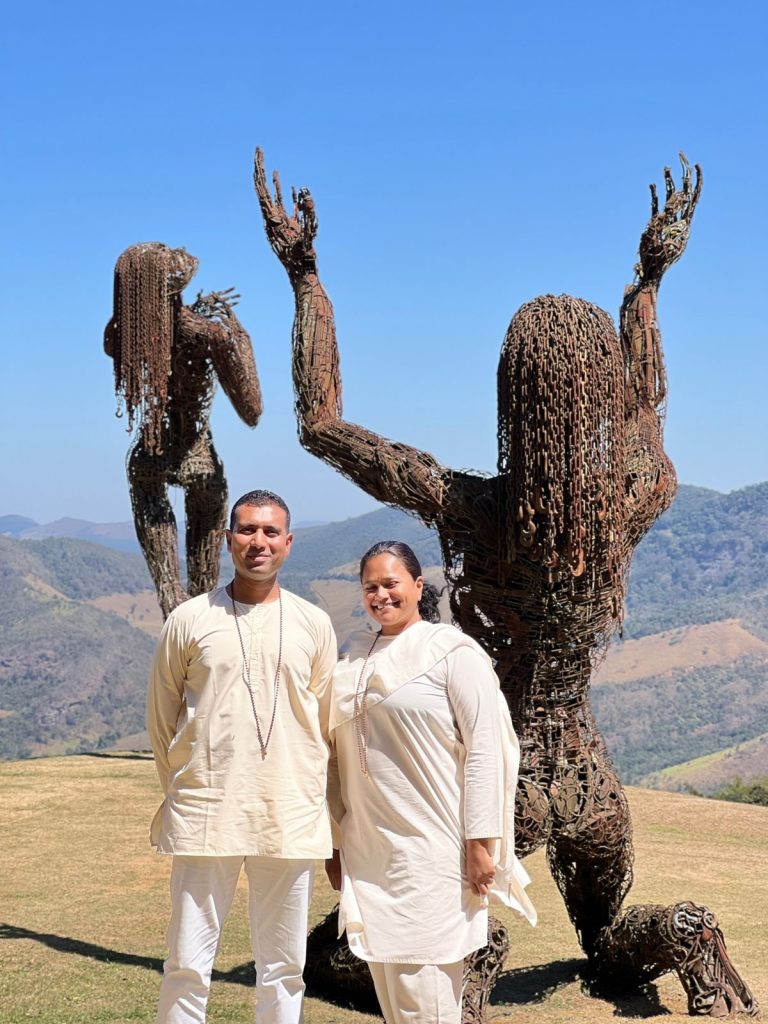
Have you ever stopped to ask yourself what your true purpose in life is? Meet Vedanta Ibitipoca Retreat, the annual Vedanta retreat at Ibiti Projeto. In the midst of the hustle and bustle of everyday life, we rarely have time to reflect on the essential questions of existence. How do we find mental clarity? How to reduce stress and anxiety? How to live with more purpose and balance? From August 27 to 31, 2025, amidst the serenity of the village of Mogol, the Vedanta Ibitipoca Retreat invites you to dive into these questions, reconnect with yourself and find answers in the ancient wisdom of India. Under the guidance of the experienced Sudhakar and Avania, from the Vedanta Academy in India, this immersion combines philosophy and self-knowledge. The program, all in English, includes inspiring classes based on the Bhagavad Gita, nature walks, yoga sessions and healthy meals, creating an ideal environment for reflection and transformation. "It's an invitation to slow down and go deeper into self-knowledge, based on ancient teachings. The expectation is to bring together a cohesive group, interested in the philosophy and seeking personal development, as happened last year" Dario Galvão, organizer of the event, which takes place in attractive locations in Ibiti Projeto Vedanta: The Ways of the Wise Vedanta is a philosophy of life that originated in India. It guides you towards a clearer vision of your personality and your purpose in the world. The retreat highlights the importance of prioritizing mental and intellectual health. Learn principles and practices to reduce everyday stress and anxiety. Delve into passages from the Bhagavad Gita and discover the true purpose of life. What is the Bhagavad Gita Written in Sanskrit, the Hindu work is the essence of India's Vedic and sacred knowledge and one of the world's greatest classics of perennial philosophy and spirituality. What to expect at the Vedanta Ibitipoca Retreat? Over the course of four immersive days, you will experience a combination of deep learning and moments of connection with nature. Mornings are dedicated to studies, hikes to the waterfalls and yoga practices that prepare the body and mind to absorb the knowledge. During the day, lectures cover essential topics such as Mind Management, The Middle Path, The Three Yogas, among others, always followed by enriching group discussions and question and answer sessions. In addition to intellectual learning, the retreat also offers the opportunity to experience practices that help reduce everyday stress and anxiety. By following the principles of Vedanta, you will discover how to integrate practical wisdom into your daily life, bringing more balance and clarity to your life. "We all need moments like this to renew our energies and see situations in different ways. We acquire more serenity and peace to make important decisions in life," says Christiano Freire, who took part in the first edition of Vedanta Ibiti. Connection with nature and healthy food At Ibiti Projeto, the experience is not limited to philosophical teachings. You can also enjoy delicious vegetarian and vegan meals, prepared with fresh, local ingredients. Healthy eating is an integral part of the retreat's philosophy, which values the holistic well-being of body and mind. Sudhakar and Avania's wisdom Sudhakar and Avania have more than 20 years' experience studying under the renowned philosopher Swami A. Parthasarathy. They have traveled to more than 15 countries, bringing the teachings of Vedanta to universities, companies and organizations around the world. With an approach that is both accessible and profound, Sudhakar and Avania are masters at making complex philosophical concepts easily applicable to modern life. Schedule - August 27 to 31, 2025 - Vedanta Ibitipoca Retreat - The entire event takes place in English Wednesday, August 27 4pm - Arrival 5:45pm - Classical Living 7pm - Dinner Thursday to Saturday, August 28 to 30 6am - Individual study7:15am - Yoga8am - Breakfast9:15am - Lectures: 10:30 a.m. - Hike to the waterfalls / Visit to the statues12 p.m. - Group session13:15 p.m. - Lunch14:15 p.m. - Rest16 p.m. - Q&A session17 p.m. - Tea17:45 p.m. - Lectures: 7 p.m. - Dinner Sunday, August 31 6 a.m. - Individual study7:15 a.m. - Yoga8 a.m. - Breakfast9 a.m. - Departure Transformation and renewal At the end of the retreat, you'll leave with practical tools for dealing with the challenges of everyday life, a greater understanding of your purpose and a new perspective on what it means to live wisely. It's an opportunity to slow down, reflect and take a new direction in your personal journey. Registration and practical information If you have any questions, please contact avania@vedantin.online Get to know Ibiti Village Book your place now and embark on this experience of transformation and self-knowledge in the heart of Ibiti Projeto! Reservations Center (32) 98449-2200
Cine Mazzaropi: The Magic of Cinema in Ibiti Village
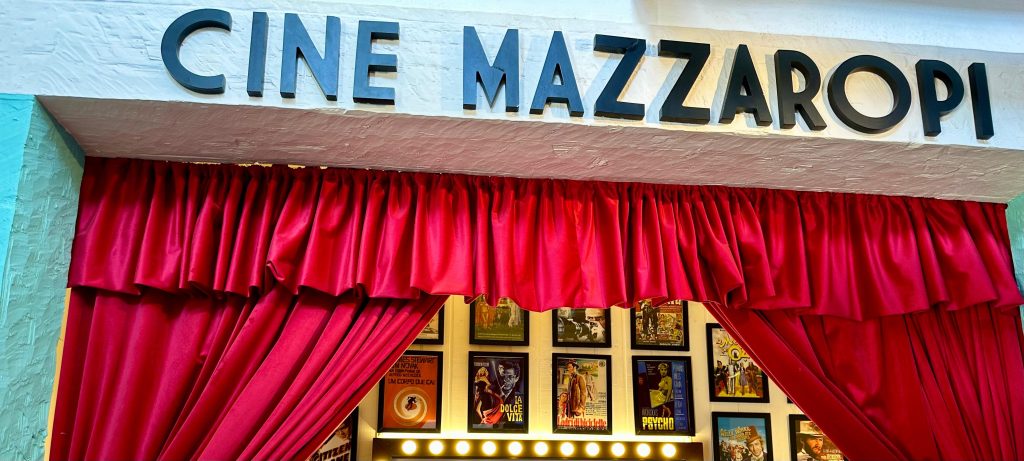
Check out 3 movie tips to watch at Cine Mazzaropi, a cultural space that recaptures the nostalgia of street cinemas
Ibiti Harvest: An immersion in sustainable gastronomy
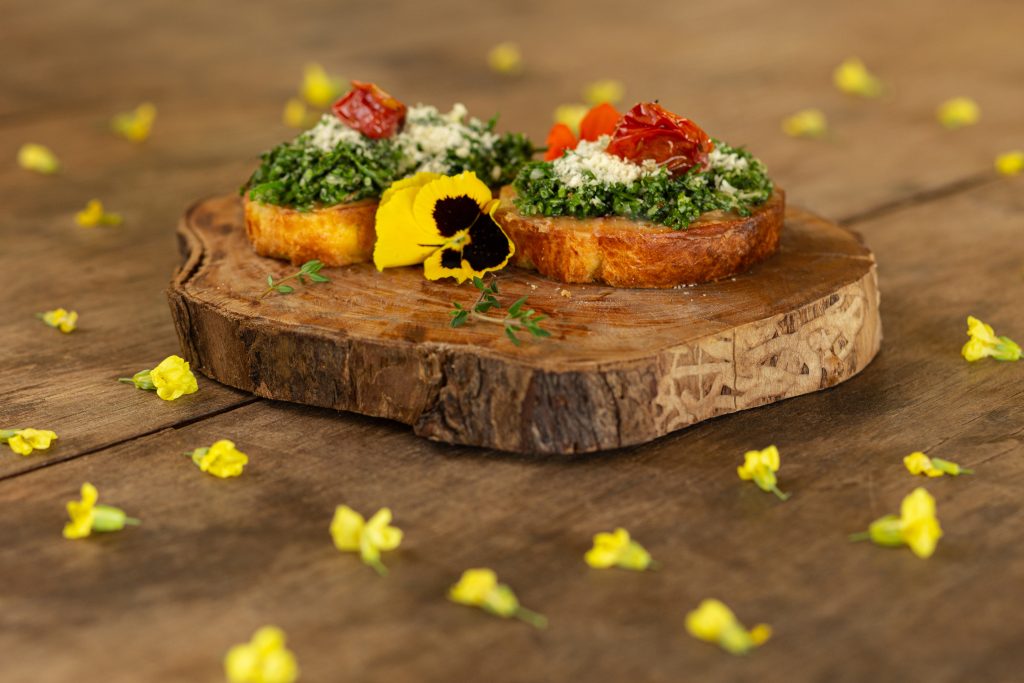
Experience Colheita do Ibiti, a sustainable gastronomic event from March 27 to 30 at Ibiti Projeto. Renowned chefs create plant-based dishes with fresh, local ingredients. Limited places available!
Local organic products: 5 reasons to eat them
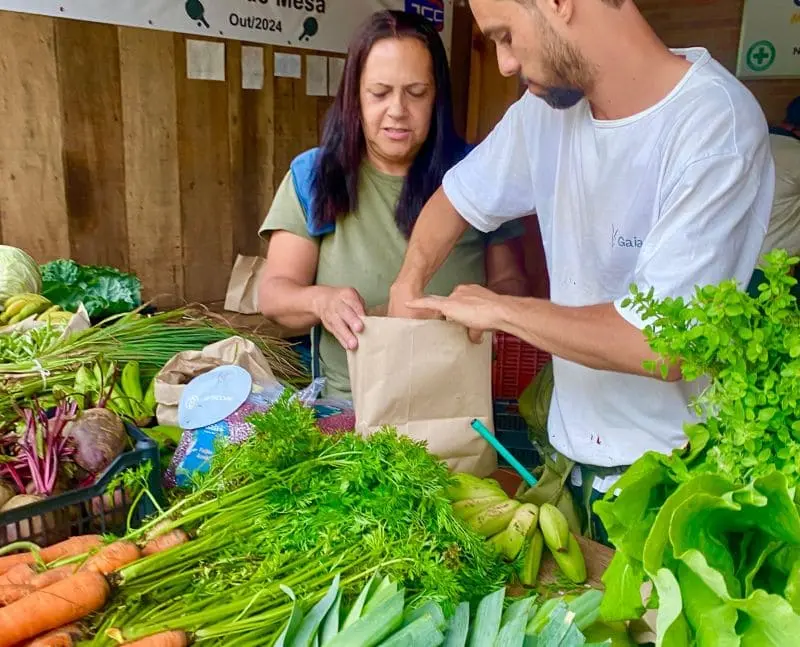
Gaia Fair connects the community with organic, fresh and healthy products, from leaves to peanuts and even asparagus
Ibiti 35 years magazine
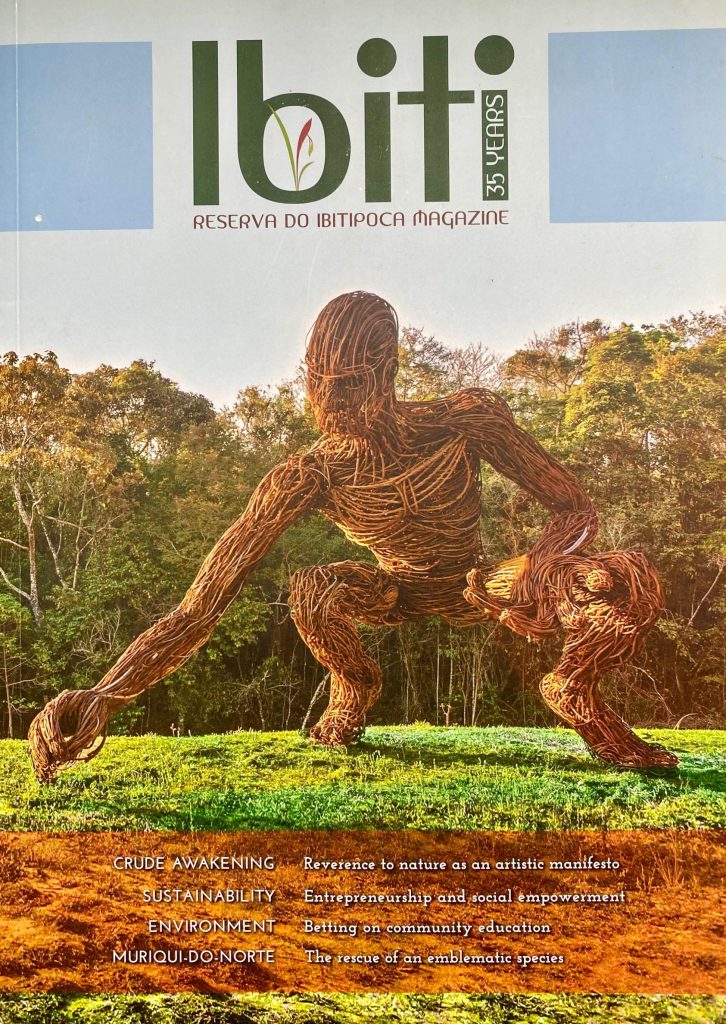
Read the first Ibiti Magazine, launched in 2017, when Ibiti Projeto was known as Reserva do Ibitipoca In 2017, we launched Ibiti 35 years to show that we were much more than just a cool pousada. At the time, we were known as Reserva do Ibitipoca and what attracted people most were the gigantic statues created by Karen Cusolito. They really are fabulous and, in the magazine, we tell you how they got to Pedra do Tatu. But our story is full of other interesting facts and actions. In particular, the persistent work to protect the muriqui, the protagonist of a detailed article. In this first edition of the magazine Ibiti 35 years, the reader takes a stroll through the forests, observes birds, learns about our socio-environmental actions and meets entrepreneurs and part of our team. The magazine has been carefully written and edited by journalist Raquel Ribeiro and designed by Jean Pierre Verdaguer. It is available in Portuguese and English. Portuguese version: Download the PDF and enjoy! English version: Download the PDF and enjoy! Reservations Center: (32) 98449-2200
Ibiti 42 years magazine
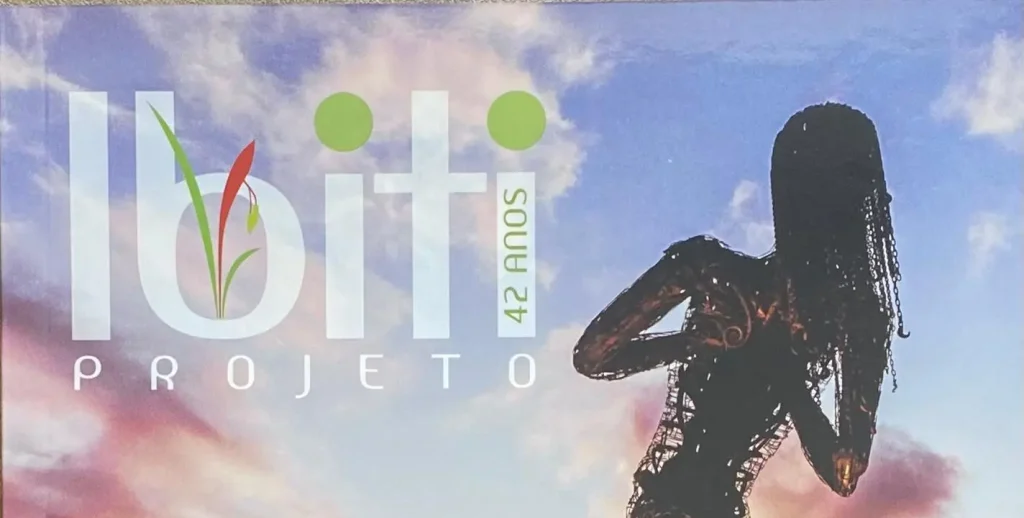
Read the commemorative edition of Ibiti 42 years magazine, launched in 2024 The second edition of Ibiti 42 years magazine, from 2024, presents our actions, projects and values the people who wrote (and write) this story. It brings up the themes of socio-environmental education, the importance of community, good relations with neighbors and, above all, the desire to celebrate life! Tasty reports, full of beautiful images, show that we value the local culture of Minas Gerais and that we are open to dialog and new ideas. With topics linked to veganism, sustainability and re-farming, Ibiti 42 years reinforces our commitment to regenerating the planet. This is another work by Raquel Ribeiro (texts and editing) and Jean Pierre Verdaguer (graphic design). Available in Portuguese and English. Portuguese version: Download the PDF and enjoy reading! English version: Download the PDF and enjoy! Reservations Center: (32) 98449-2200
Ibiti Journal: Discover the first edition of the Ibiti Projeto newspaper

Ibiti Projeto innovates once again and presents Ibiti Journal, a printed newspaper that brings back the classic format and the pleasure of leafing through pages filled with inspiring stories. The first edition, Fall/Winter 2024, marks the arrival of a new season and brings rich content that connects sustainability, culture and experiences in the mountains. 📰 What You'll Find in the Ibiti JournalWith eight pages in black and white, the newspaper presents: 📖 A Newspaper That Stands the Test of TimeThe Ibiti Journal is more than a newsletter - it's a celebration of the connection between nature, culture and sustainability, with a retro look that delights readers. The ads for Ibiti's developments complete the experience, bringing charm and nostalgia. 🗞️ Download the Full Edition PDFTo access the digital version, click here and discover how Ibiti Projeto is transforming lives, preserving biodiversity and inspiring change. Happy reading! 🌱
Lixo Zero: Actions reduce the impact of waste in the Ibiti Project
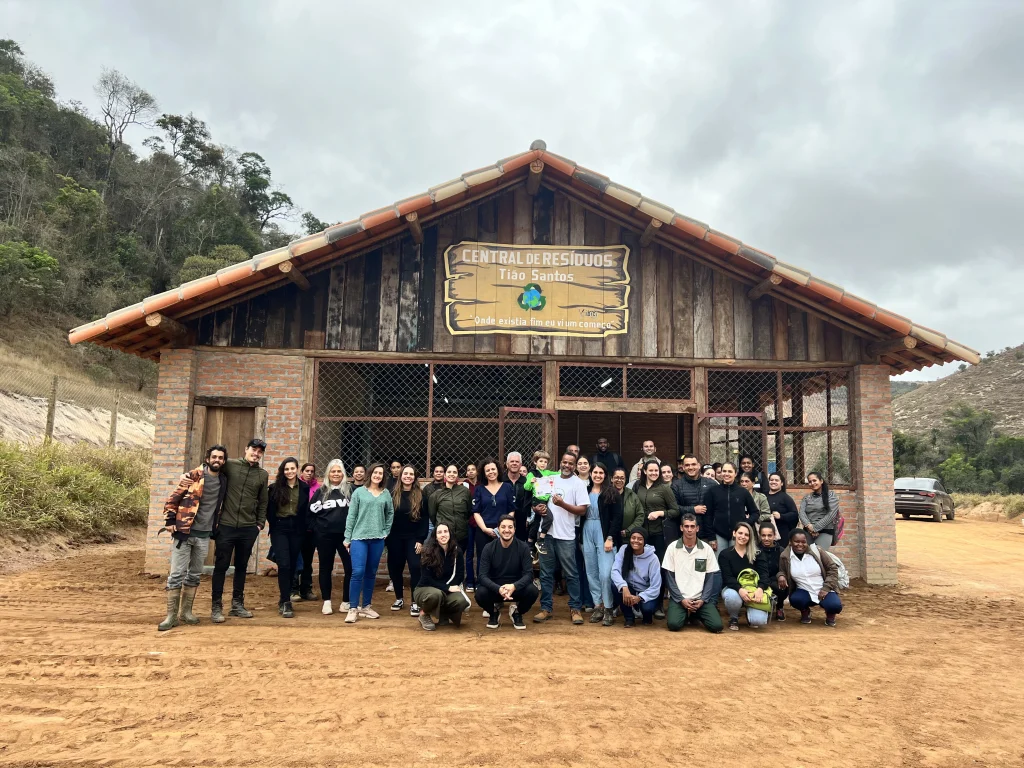
Vila Mogol has a Selective Collection Point and a Waste Center. And what do you do with your trash?
Piano concert at Oca: A soundtrack for Ibiti
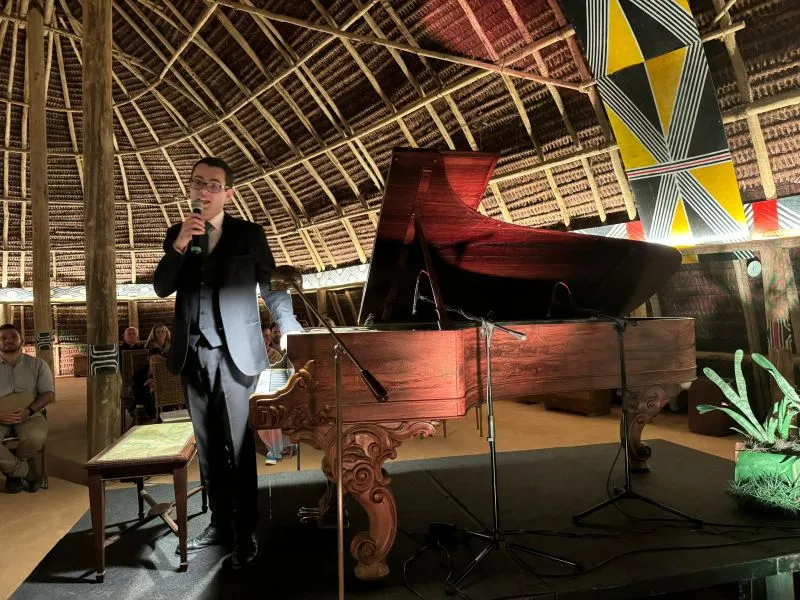
Ibiti Project receives musical tribute. Suite No. 1, composed by Lucas Soares, was presented in a piano concert at the Oca
Tapir in Ibitipoca: New resident of Ibiti brings lessons about regeneration
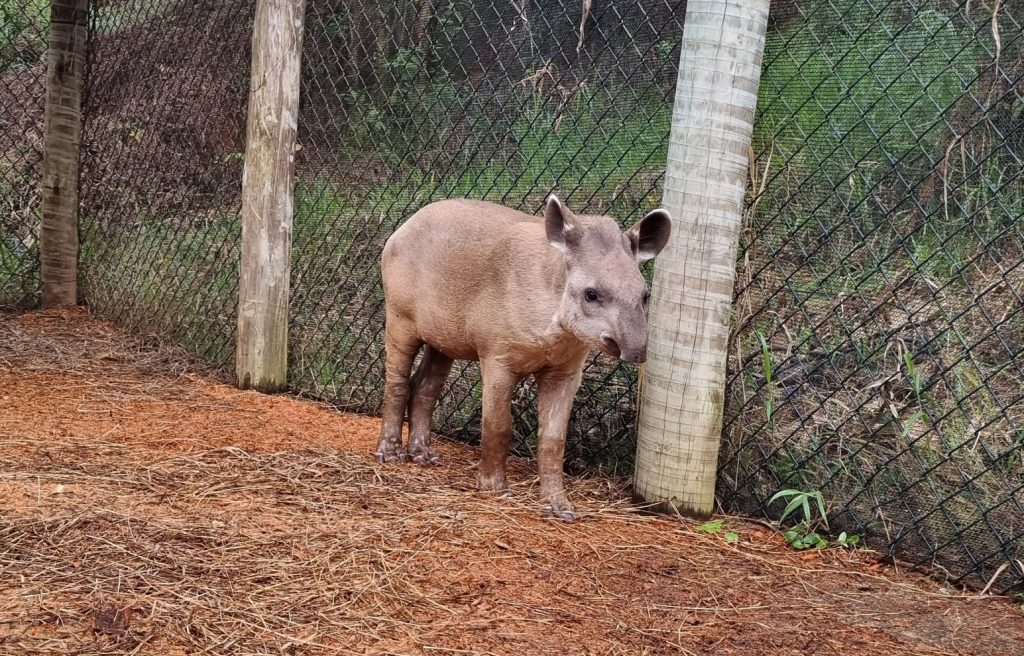
Meet Bambu, the baby tapir in Ibitipoca, an ambassador for preservation, and understand the importance of this species for biodiversity
Vacation with children in Ibiti: Fun and connection with nature

Programming includes picnic at the Statues, stargazing, visit to the muriquis and much more
Ibiti’s Minas Gerais cuisine: Dishes from the land and full of stories

Ibiti invites you to try fresh, local ingredients Ibiti's Minas Gerais cuisine dates back to the Gold Cycle. Starting with the unparalleled taste of that homemade comfort food prepared by the locals in the Areião restaurant, with a deck overlooking the sea of hills and a recently renovated, elegant and cozy room with glass windows. There, high up in the air, Dona Maria runs the wood-burning stove, where the potted meat, the free-range chicken, the braised vegetables come from... And there's no shortage of sweets and delicacies from the mountains. Minas Gerais cuisine in Ibiti Minas Gerais takes on a more refined feel in the restaurant at Engenho Lodge, a large house reminiscent of old farms. The freshly baked cheese bread is the most popular breakfast delicacy, alongside the traditional cinnamon bread from Ibitipoca. In the evening, the menu is inspired by the cuisine of chefs such as Claude Troisgros and Pablo Oazen, produced by hands from Minas Gerais, which include affection and a little cheese wherever you can get it. PANCs (unconventional food plants) and the fruit of the juçara palm, typical of the region's forests, give personality to dishes at the vegetarian restaurant Yucca, which stands out in Ibiti Village for its beds of edible flowers at the entrance, the passion fruit covering on the outdoor tables and the vegetable garden of leaves and spices. It's about seeing and tasting real farm-to-table cuisine.



